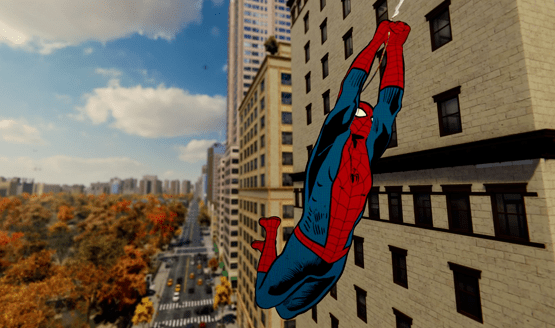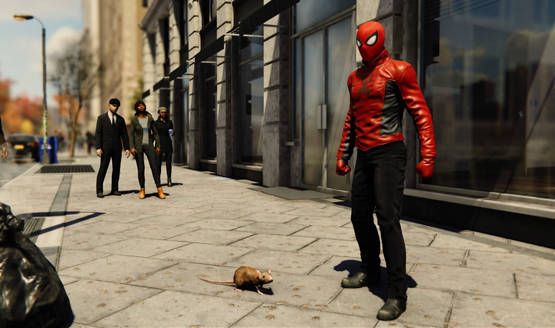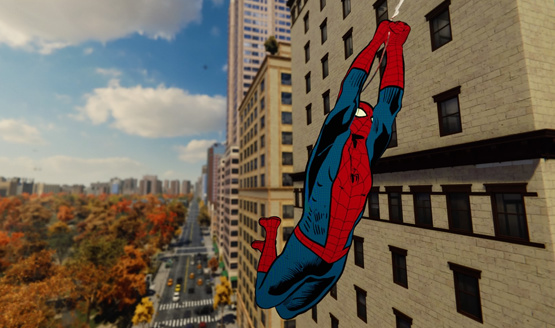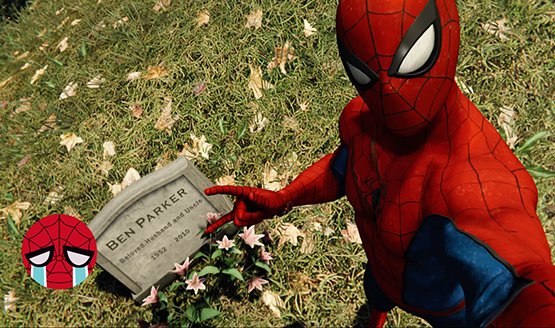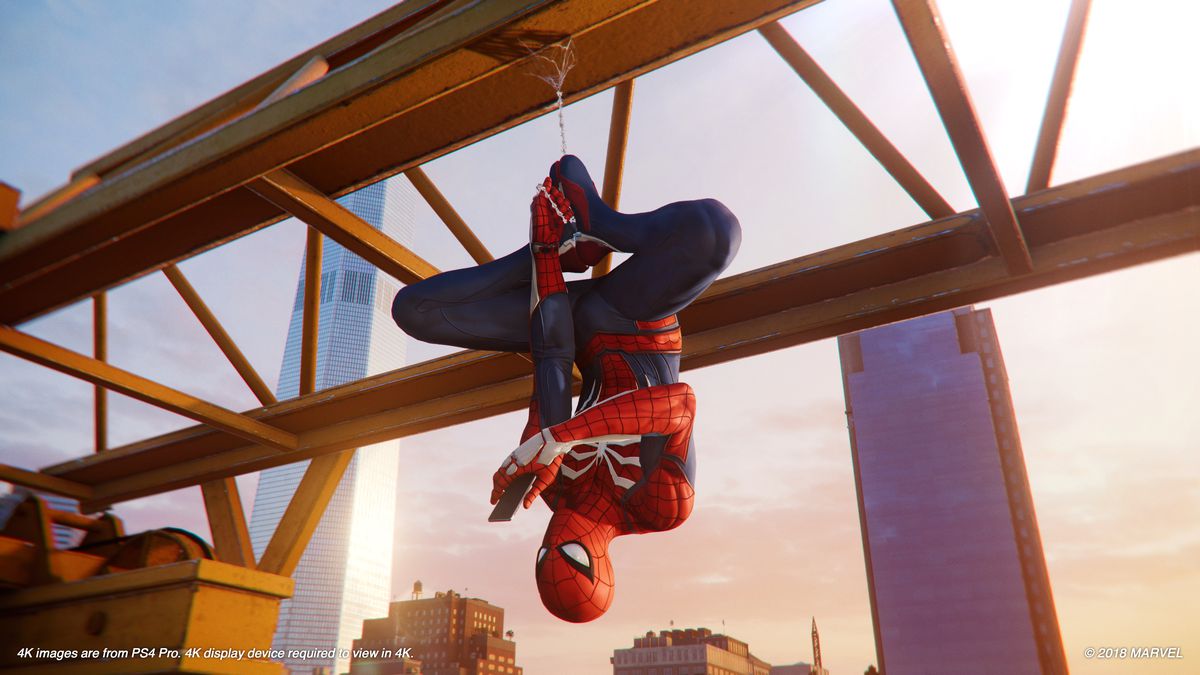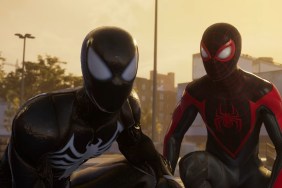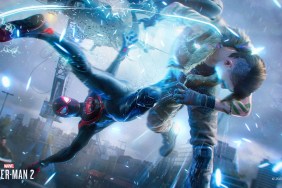Marvel’s Spider-Man is finally out and it’s a massive hit. Critics love it. Fans love it. Insomniac plans to continue to support it with DLC and updates, including a New Game+ mode coming soon. Here at PlayStation LifeStyle, we’re big fans of video game music, so when we got the opportunity to sit down with the Marvel’s Spider-Man composer, John Paesano, we were eager to hear what he had to say about his process of writing music for the game.
Paesano is an experienced composer with a number of notable credits under his belt. He’s done music for The Maze Runner series of films, Netflix’s Daredevil and The Defenders, and in video games, you can hear his work in Mass Effect Andromeda, Detroit: Become Human (Markus’ soundtrack), and now, of course, Marvel’s Spider-Man. We asked him about his work across all three mediums (film, television, and games), and how he uses music in order to make a superhero feel more relatable.
PSLS: You did the soundtrack for the new Spider-Man game. Tell me a little bit about that. That’s pretty exciting, pretty big. When you’re looking at all the hype surrounding it, did you expect it to be this big of a thing?
John Paesano: It’s funny, when you get started on these things, it’s so early in the process you can’t really predict how big or how not big it’s going to be. It’s Spider-Man, you know, it’s always been a big property, but it’s been done so many times that you kind of never know how people are going to react to the initial idea of it. Are people going to be really excited about it, or because it’s kind of been with us for awhile now, are people just going to go, “oh, it’s just another Spider-Man game. As we started working on it, it didn’t take too long to find out that it really is kind of a special project and a lot more. It was done so tastefully and on such a high level that you kind of knew it was going to be something special as soon as we got running with it.
I was really excited to get going and then as we started getting into character development and themes I really got to see how well thought out it was and how well Bryan [Intihar], our director for the game, really handled it. It almost felt like we were working on a film and not your standard game. So being a film guy myself, it made me really excited as far as the music aspect goes. To answer your question, yeah, it really was an exciting and big project to be working on
PSLS: How early in the process were you involved and how involved with the overall process of the entire game were you? Was it just the soundtrack side or have you had a lot of eyes on, or even suggestions throughout story development and things like that?
Paesano: I think I worked on the game for almost two years, so I was on—and it was smart on their part—from a very, very early stage. Bryan’s a big fan of music. He knows the importance of it in the game and because he really wanted this to feel as cinematic as possible, it really became important that the music just wasn’t kind of underscore and functional, but it was actually a character in the game. He really wanted to utilize themes, and he wanted the theme development, and he wanted the characters to have themes. So from that aspect of it, I was brought in from, I would say probably towards the end of story development and all the way through the final development of the game.
Which was awesome because, especially these days, composers get brought on so late in projects that the process of trying to figure out what doesn’t work before you figure out what works gets rushed through. Writing music for any type of film, game, episodic series, there’s a process where you kind of have to go through a large experimental phase before you land on what’s going to work for the property. So I think it was smart of them to bring me in early and to allow us to experiment through that. I mean, it took us a couple months just to find our initial theme and concept. And then from there all the other themes kind of split off from it for other characters throughout the game. So I would say in all in all, I was really brought in from an early phase, but we really utilized all the time that we had developing all the different themes for all the characters.
PSLS: So while you were developing all those themes you mentioned—obviously Spider-Man has been done in a million different iterations before video games, movies, TV shows, comics, everything—he’s had different themes before. Was that something that you looked at? How Spider-Man had been portrayed previously and previous musical themes or did you approach this with completely fresh eyes?
Paesano: That’s a good question. Because Spider-Man had been done so many times before, and not just from a musical aspect, but also from a story aspect. Spider-Man has always been a fun, bouncy kind of character. You know, he’s got a lot of banter obviously, whether it’s in the films or the comics, he’s always kind of being portrayed by this young teenage, happy-go-lucky kid. And I think Bryan’s approach on it was in this version of Spider-Man, they aged Spider-Man up a little bit. He’s no longer Peter Parker, the teenager. He’s a little bit older, they aged him up a little bit. He’s already been Spider-Man. It’s not an origin story, so to speak.
So I wanted to kind of do the same thing with the music. Spider-Man music has always been very bright and fun. It’s always had a wink and a smile with it. And I really wanted to kind of give him a more grown up approach. I wanted to kind of give him a little bit more weight, give him a little bit more gravitas as far as his character went. And I think we did that, but it was also still important to keep some of those things that the fans do love about Spider-Man. We don’t want to make him too serious because I think a lot of the charm of Spider-Man is that he does kind of have some of those [qualities].
He has grown up a little bit. He’s not by any means old or anything. But at the same time too, you change a lot from when you’re 16 to when you’re in your early twenties. We kind of wanted to make that reflective. Not only did Bryan in the story, but I wanted to do it too with the music and the feel, and how he views the world. So in the music, I tried to keep some of the old classic elements of that Marvel Universe, but at the same time too, I took the approach where I scored more Peter Parker than I scored Spider-Man.
That was the approach I tackled that with. I wanted to get—And Bryan as well, he wanted to have the player and the viewer connect with that struggle between Peter Parker and him being Spider-Man. I approached it from “okay, let’s score Peter Parker and let’s not just score Spider-Man,” if that makes sense. I wanted to give more to his human side and less to his superhero side.
PSLS: You mentioned going off of previous Marvel themes—the Marvel Cinematic Universe is a very big thing, you get all these various different movies with different themes across all of them. But I feel like, especially in the soundtrack side of things, there’s a very similar vein that runs through every single one. Is that something that you also looked to, was how big the Marvel Cinematic Universe is?
Paesano: Yeah, I think so. You don’t want to completely ignore it, because there’s been so much success with that. And I think Bryan, being conscious of that, wanted it to feel very cinematic. He didn’t want to completely go in an opposite direction from that, just because there are people that love those films, they love those properties. They love the feel of them. They make billions of dollars in the box office, so I think you kind of have to be conscious of that. [But] we’re a little bit different. It’s a good question. It’s one of those things where you kind of have to thread that needle where you want to do your own thing, but at the same time too, there is a reason why those films are so successful and why they do so well.
You have to always keep that conscious in the back of your mind and you have to figure out how much you want to stray from that and how much you want to still remain in that world. It’s always this balancing act of making sure that we still feel like we’re part of that world. But at the same time too, we want to give the game and the story its own identity. I think the big thing for us is, essentially when I was going through the game and we were developing these things, I just wanted to try to keep it as simple as possible when it came to the thematic aspect of it. I didn’t want to overload people with “Here’s Spider-Man’s scene, okay, here’s Peter Parker’s scene, okay, here’s…” You could overload people with so many different themes to where all of a sudden it just starts to sound like just a bunch of random music.
I really wanted to capture an all-encompassing theme with Peter Parker and Spider-Man and do just reiterations of that theme and skin it in different instrumentation, different arrangements. So people are hearing the same melodic content, but it’s skinned in different ways to give a different feel. I think you will hear the Spider-Man thread throughout the whole entire score. It’s very obvious when that Spider-Man theme comes in. You’ll know when you hear the theme and when you don’t hear the theme. I really wanted to make sure that when we do use the theme, it’s very obvious when that theme is being used.
In a lot of other Marvel worlds, it’s easy for the themes to get lost in the grand scheme of all the other music. It’s hard to identify them sometimes. I think Marvel gets knocked for that sometimes. Obviously The Avengers theme is very obvious to me, but some of the other ones, it’s hard sometimes to pick out what the actual theme is of the show. I didn’t want us to fall kind of in that trap, so I just really wanted to make sure there was a clear, concise, hummable theme that will stick in people’s heads and that’s always kind of the goal. Obviously the soundtrack comes out soon. So we’ll see. We’ll see if we were able to accomplish that
PSLS: So it’s reskinning the themes for different characters. It helps make everybody feel, like you said, not as jumbled and more like they’re part of Peter Parker’s story.
Paesano: Yeah. Like for instance, there’s a lot of different characters throughout the game and they all have their own separate themes. But at the same time, Peter’s theme always seems to make it into them at certain points. You know, if Peter is fighting a villain and that villain’s got his own theme, I always tried to make sure that the Peter Parker/Spider-Man vibe was still kind of interwoven within that. You’re always kind of being reminded that this Peter Parker/Spider-Man motif is always kind of weaving itself in and out of these other themes. So even though there are other themes in the game, you’re always going to be getting reminded. It’s kind of like a John Williams technique that he always used to use, or still does use, I should say, in the Star Wars films. You always hear those Star Wars motifs throughout the movie. So you’re always being reminded of what those things are. We do a very similar kind of technique within the Spider-Man game.
PSLS: This is not your first outing at all with Marvel, actually superheroes in general, because you did Superman Batman Apocalypse back in 2010 and then more recently you’ve done the Marvel Daredevil and The Defenders Netflix series. How did your work with those, and having done superhero work before, help prepare you for this project?
Paesano: Well they’re all so different, you know? I mean, Marvel—it’s interesting with the Daredevil stuff, I almost wanted to take a very similar approach. I scored the first season of Daredevil almost like it was like a film, like Michael Clayton, like it was about a lawyer. I always try to approach him from the non-superhero side, which is interesting. And that was a technique we used for this Spider-Man game. It’s a lot. It’s a little bit of a different animal than Daredevil.
For me, it’s always important with these superhero properties, especially with Daredevil and The Defenders and even with some of the Spider-Man stuff, I’m always trying to ground the character a little bit because it’s almost like—Spider-Man for instance, you know, he’s got a suit. He swinging around the city. There’s very obvious superhero traits to them. So when you throw just a bunch of big superhero music on top of him, sometimes it’s hard to kind of connect them to the real world. Whether they’re watching these properties are playing these games, there’s always this nice connective tissue. I think that happens sometimes, when you can relate them to the real world. I think music can really help with that. If you put this giant superhero on music on top of this giant superhero game, it’s almost like having a sundae and dumping a whole bag of sugar on it.
I always try to balance out some of the things a little bit. I always use the word “ground”— to try to ground the character a little bit. It was the same thing with Daredevil, you know, we really kind of scored it like a drama versus a giant superhero. And then of course, at a certain point you have to kind of submit a little bit and go into that superhero world. But it’s always just trying to find that balance between large superhero music, but then also trying to connect into the world that we all live in. And I think when that happens, it can give the story a little bit more weight and can also lend itself to making it seem a little bit more believable, and you can kind of connect it to your real world, which has always been kind of fun.
PSLS: And you get the contrast too, between if you go all big superhero the whole time, it just feels all big. Whereas if you go big superhero for specific moments, it can make those moments feel even bigger.
Paesano: Absolutely. That’s where the magic happens. It’s the same thing with over-utilizing themes. You don’t want to just, you don’t want to just keep banging people over the head with themes over and over again, because then when you do use it, it really punctuates and it shines through. Honestly, that’s a skillset as a composer you’re always trying to build and get better at. Everybody at the level that I’m working at, everyone can write music. Everyone’s a really good composer. I think the thing that separates the guys who are a little bit more advanced than the guys who aren’t—it’s not necessarily the music, it’s how they’re using the music against picture and learning how to control the score and learning how to apply it to picture that separates the guys all the way at the top to the guys who are still younger and coming up.
That’s something that takes a whole career to kind of develop. You take guys like Hans Zimmer and James Newton Howard and John Williams and I mean, these guys have been scoring hundreds and hundreds of films. Then you take a guy like me who’s getting my feet wet in this business and that’s a skill set you kind of have to develop. Every time you work on a project you get better and better at it. You’re always trying to strive to improve. Now with all these different genres too, it’s different. You know, when you do something for a video game, the application’s different than when you do it for a film versus when you do it for an episodic series. There’s just so many different genres now and they all require a different level of that. But the cool thing is, especially with video games, the video game world is right up there with film now when it comes to how we approach scoring the games, how the application of the music is in the games and how you record stuff. It’s very, very close to how we work with big Hollywood studio pictures, which is a lot of fun. It’s a great medium to write in.
PSLS: With video games specifically, you’re speaking of getting your feet wet. You’re relatively new to that. You did Mass Effect: Andromeda which came out 2017. You helped with a Detroit: Become Human this year, and then you’re doing Spider-Man now. With film and even with a television series, you have a very precise timeline. You have linear tracks, you have “Oh, this scene is exactly three and a half minutes long, so we need exactly three and a half minutes of music,” you know, where to cut and paste and make the music work for each individual portion.
With video games, depending on the game, depending on the scene and everything, that’s a lot more fluid and sometimes players may rush through something or somebody may take their sweet time and just be swinging around the city and smelling the roses. How do you approach writing music for something where it’s going to be so fluid and you really never know when people are going to kind of move on to the next theme or the next track or the next big beat and moment?
Paesano: In a weird way, scoring these video games is almost how you used to score movies, before all that technology got involved with scoring film and before we had sequencers and computers were involved in figuring out frame accuracy and how this head right here is going to line up with this over here. Movies were much more loose. You were working with film, you were working with Moviola, you weren’t working with computers. So when a composer scored a film, they didn’t necessarily like just put up scene by scene and score those scenes. It was more of a general idea, it was more, “This is the film, here’s the script, this is what the movie’s about. These are the, we have these characters, we want themes for these characters.”
You did all this work before you actually started applying music to picture. When somebody’s got a movie, you sat with the director and talked about it and he said, “Well we have this character here and we have this character here.” You would go back to your studio or your piano or whatever, and you would develop themes for the characters, not necessarily the picture, but based off of story ideas or conversations or script or whatever the material that was given to you in order to develop those themes. And then a director would come in and he would listen back to those themes on the piano. And then he would say, “I love it, or I don’t like it,” but then then after everything was approved, then you would start applying those themes to the actual film.
These days with film, we get the film, we put it in our sequencers, we load in a scene, we look at it and we say, “okay, let’s start writing to this scene right here.” So in a weird way, scoring video games now is kind of like how we used to score films back in the day before we had all the technology because it’s more conceptual. Bryan would come in and some of the guys from PlayStation would come in and they said, “okay, well here’s the general story, here’s some of the artwork. We have these characters, we wanted develop themes for these characters.” So I would just be writing to the conversations that we would have about Spider-Man or about Kingpin or about the Sinister Six and would be coming up with these different themes and ideas.
And then once those themes got approved, we would kind of put them in the back pocket and then when those sections came up for the game play, then we would start getting more specific on how we want to apply those themes now to the game. Hopefully that all makes sense, but it is kind of done almost how we used to score movies 30, 40 years ago. And there’s a benefit to that from a musical perspective. When you’re writing like that and you aren’t writing to picture with dialogue and sound effects and your music is completely uninfluenced, you’re literally creating the whole scene with your music.
Sometimes when you write to picture and you have dialogue in there and backgrounds, your music is really shaped sometimes by, oh, there’s a lot of sound effects right here, therefore I’m not gonna do anything with the French horns in this moment right here because it’s going to clash with this. Your music becomes less musical and more functional in that median. A lot of times when I start a film, I always write suites, to avoid having the music be too influenced by dialogue and sound effects. And then once the suite gets approved, then I’ll start applying that—stop and start thinking about some of those other things. But I think it’s always kind of the kiss of death when you start writing music right away to film to actual scenes and not kind of have a general idea of what you want to do before you start applying the music to the picture.
I really enjoy working in video games for that reason, just because it usually yields really musical, vibrant scores. In a lot of ways, I think that’s why John Williams’ music is so musical and vibrant and so colorful. It’s because he approaches films in that kind of manner. It’s not like you just get up, get the film, and start writing to a scene with dialog and it right away as you’re conceptualizing your score for the movie, there’s a whole process that kind of needs to happen before you even get into that side of it. Video games force us to work in that in that manner as well. I think you’ll notice not just in Spider-Man, but in a lot of video game scores, the music is very vibrant and very musical and it’s a great, great medium for composers to work in.
PSLS: So you’re kind of a jack of all trades here, especially now, just getting into video games within the last few years. You’ve done movies, you’ve done television, you’ve done all these different genres and ideas for, for scoring and film composing. We’ve heard the name Han Zimmer come up now, John Williams—is there anybody on the video game side of things, video game specific composers that you’ve looked to or really enjoyed their work over the last few years as you’ve gotten into that side of things?
Paesano: I love Jeremy Soule’s stuff for Skyrim. I really enjoyed that score a lot. I mean there’s so many. There’s just been some great—you know, Gustavo [Santaolalla]’s stuff for The Last of Us was really cool and different and unique. I love Henry [Jackman]’s stuff and Uncharted. What’s interesting now is all those guys that I kind of know, [they are] my peers and stuff in the film world. They’re kind of in this world as well. But, um, I don’t even know if there’s guys who are just purely [game] specific. When I worked on the Mass Effect stuff, I got a chance to listen to a lot of the older Mass Effect scores, which I thought were really fun and cool.
I mean, the stuff for Battlefield is amazing. [Johan Söderqvist] does an amazing job on that stuff. I mean, there’s so many good guys out there. It’s just, um, and like I said, I was a fan of film scoring before I even got into it. That’s all I listened to when I was a kid were film scores. So I’ve always just been a huge fan of it and it’s just one more medium to kind of give me more ways spend my money. There’s definitely no shortage of amazing writers in this world and video games just kind of adds one more genre I really enjoy.
I tend to enjoy a lot of the games that are—everything I listed is more or less big cinematic either RPG or open world stuff and I really kind of enjoyed that genre. Horizon Zero Dawn stuff is really cool, I like how they did the concept of that score and also the Detroit stuff. I thought it had a real opportunity to be a real disaster by getting three guys to do three different characters and you kind of go into it going, “man, I don’t know how they’re gonna make all this feel fluid and make it all work.” I gotta hand it to ’em they did an amazing job getting all of us in sync with each other and giving all those characters their own world and stuff. It’s just really fun. The other cool thing about the video game world is that they’re just doing things with music conceptually that’s just not being done in the film world, the fact that it is not linear, you get some really cool, amazing scores.
PSLS: Awesome. Well, lastly, looking at your video game profile here, you’ve done three very high-profile games. Is this a space that we can expect to continue to see you in?
Paesano: Absolutely. Yeah, for sure, listen, I see this as kind of the future, you know what I mean? I was saying in another interview, if you ask a kid, “hey, do you want to go watch Spider-Man or do you want to go be Spider-Man?” I think the kid’s going to say “I want to be Spider-Man.” And I think video games allow you a very intimate experience into that world, especially now with all the VR stuff happening, I just think it’s the future. I think, it’s a world that I really, really enjoy writing and it’s extremely creative. The process really lends itself well to a composer’s skillset. So absolutely, I’m going to be working in it, hopefully for the rest of my career.
We’d like to thank John Paesano for taking the time to talk to us about his work on Marvel’s Spider-Man. The Marvel’s Spider-Man soundtrack will be available later this month for both digital purchase and on physical limited edition vinyl.
Essential Reading
- All 28 Marvel’s Spider Man PS4 Suits Ranked From Worst to Best
- Here Are a Few Easter Eggs in Marvel’s Spider-Man
- Spider-Man PS4 Dialogue Was Recorded Twice, Dynamically Switches Between Normal and Exerted
- The Side Characters Steal the Show in Marvel’s Spider-Man
Marvel's Spider-Man PS4 Suits Ranked September 2018
-
Marvel's Spider-Man PS4 - All 28 Suits Ranked
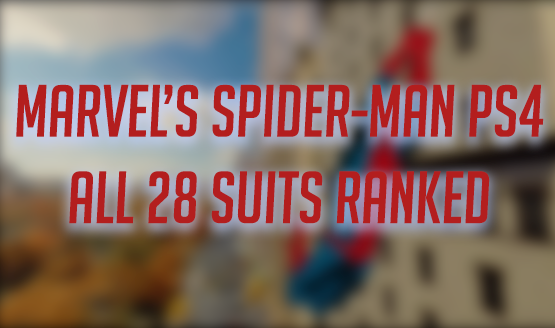
There are 28 suits in Marvel's Spider-Man PS4, some far better than others. Using the photo mode, critical analysis, and our good ol' fashioned opinions, here are all 28 Marvel's Spider-Man PS4 suits ranked from worst to best.
-
#28 ESU Suit
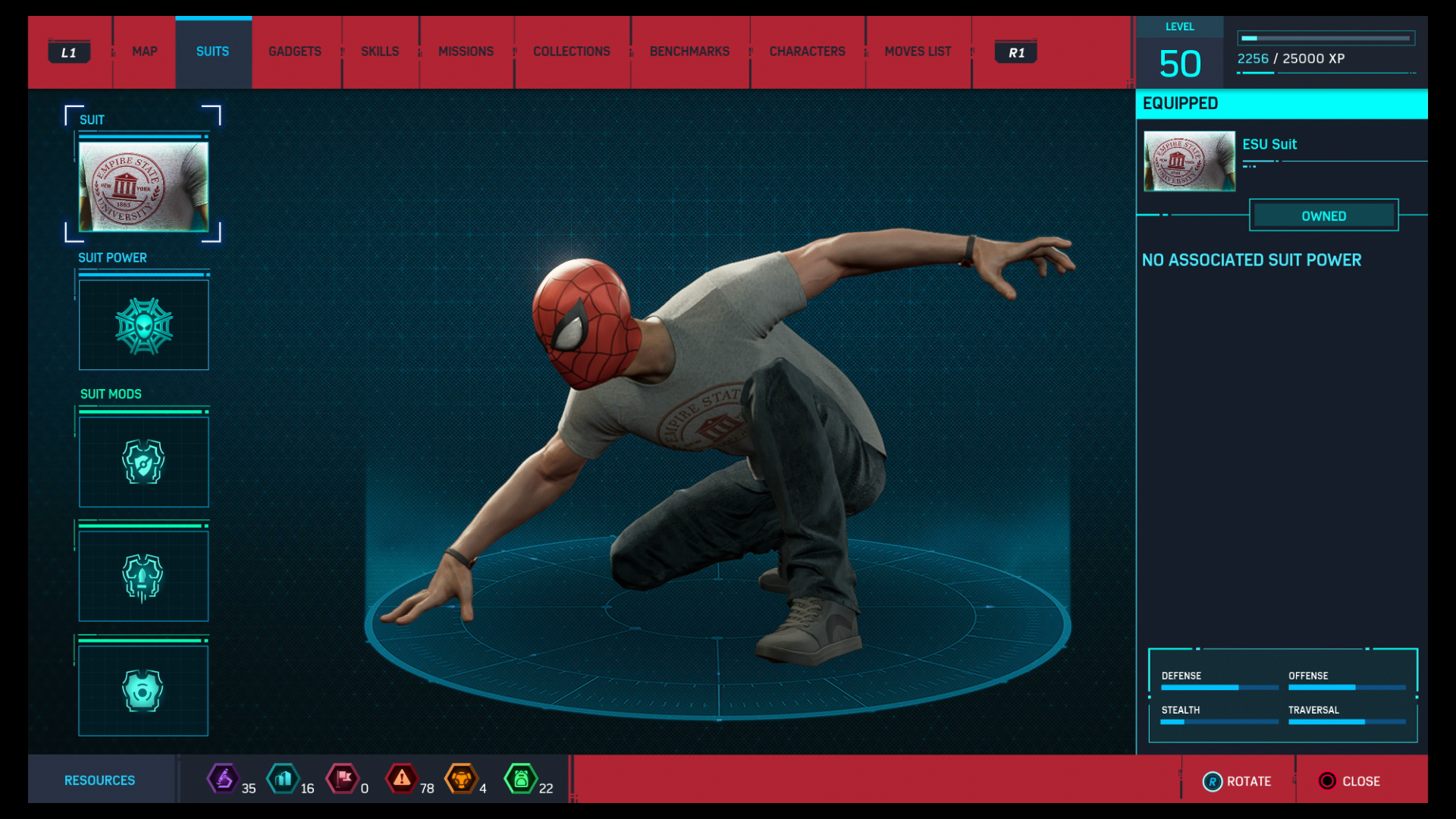
Apart from being one of the most boring suits in the game comparatively, the slap in the face is that this is the reward for getting all of the secret photo ops hidden around the city, which will probably make it the final suit you unlock. I was kind of expecting something a little more for my efforts than just honoring Peter Parker's alma mater.
-
#27 Classic Suit
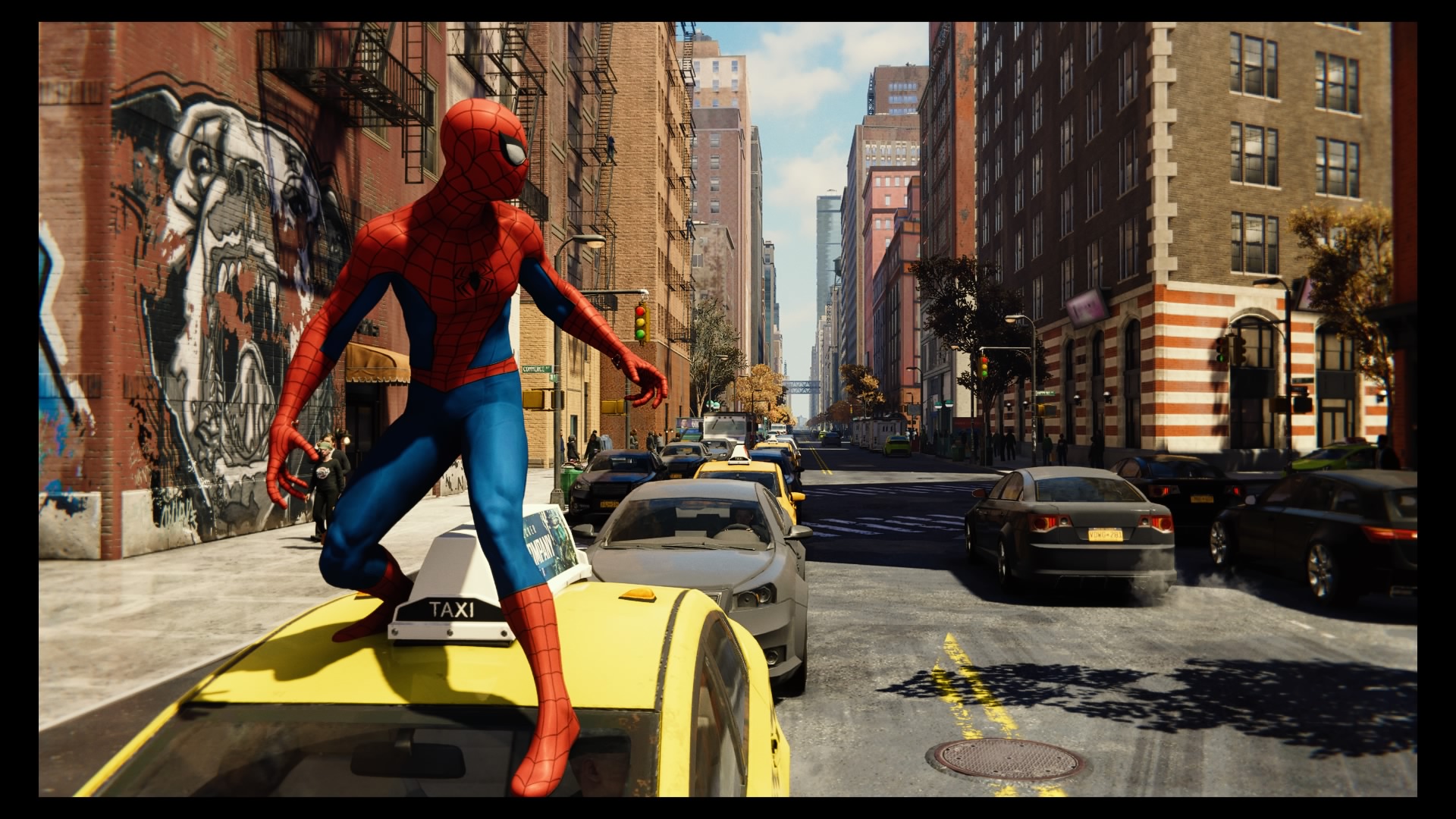
Now, there's nothing wrong with the classic Spidey suit per se, but it just can't compare with a lot of the other unique suits on this list. We put it low on the list simply because it lacks the flair and/or humor of the other suits.
-
#26 Electrically Insulated Suit
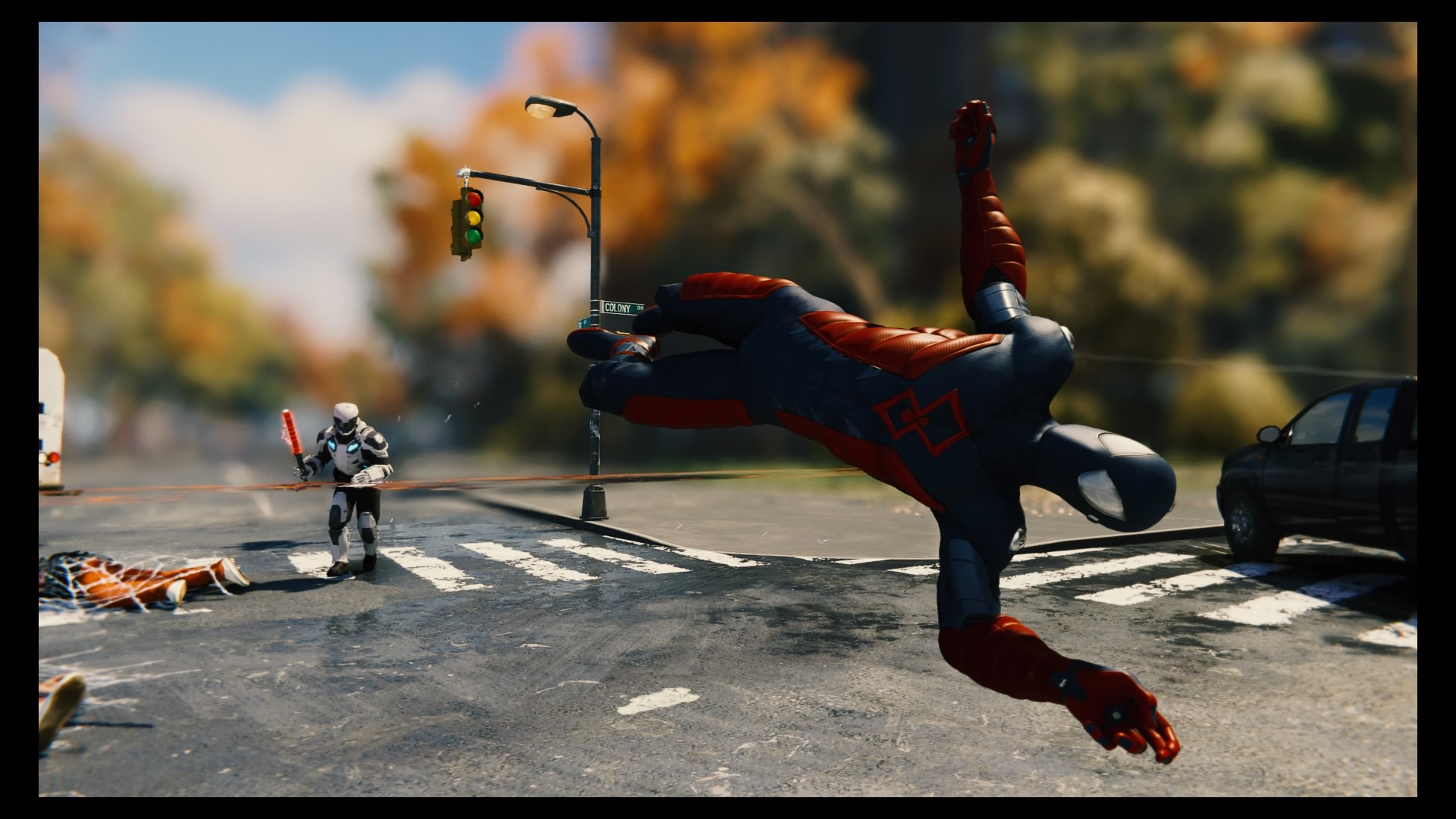
This suit was designed by Peter in Amazing Spider-Man #425 to combat Electro and protect himself from his electric attacks. While its function may have saved Peter's bacon on a number of occasions, the hero clearly wasn't thinking of fashion when he designed this fairly ugly suit.
-
#25 Spider Armor - MK III Suit
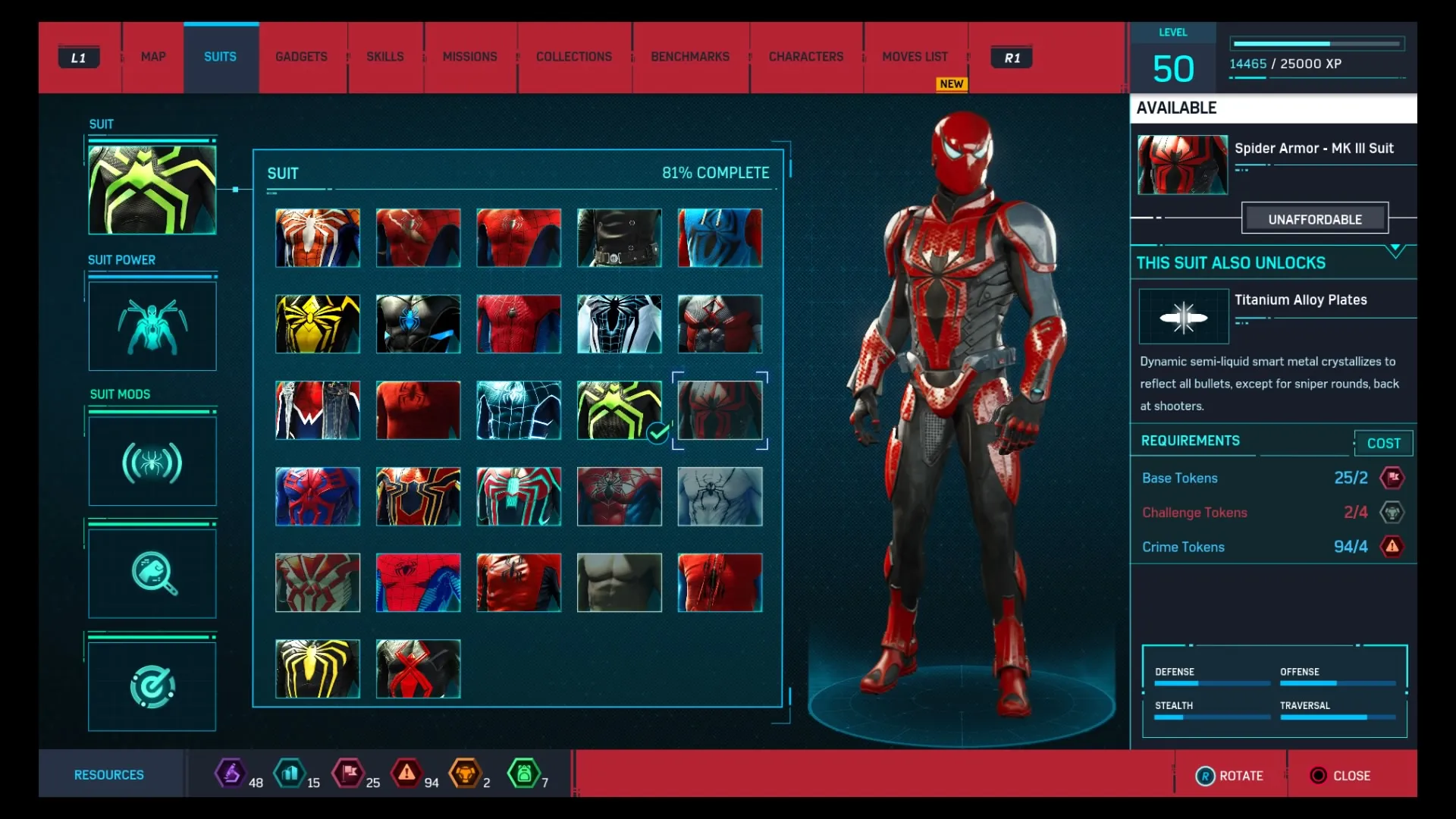
Created in Amazing Spider-Man #682, the Spider Armor MK III has a ton of features packed into its beefy shell, none of which are actually usable in Marvel's Spider-Man PS4. The mask is a little bit reminiscent of DC's Deathstroke, and it's a bit too bulky to be our favorite.
-
#24 Spider-Man 2099 White Suit
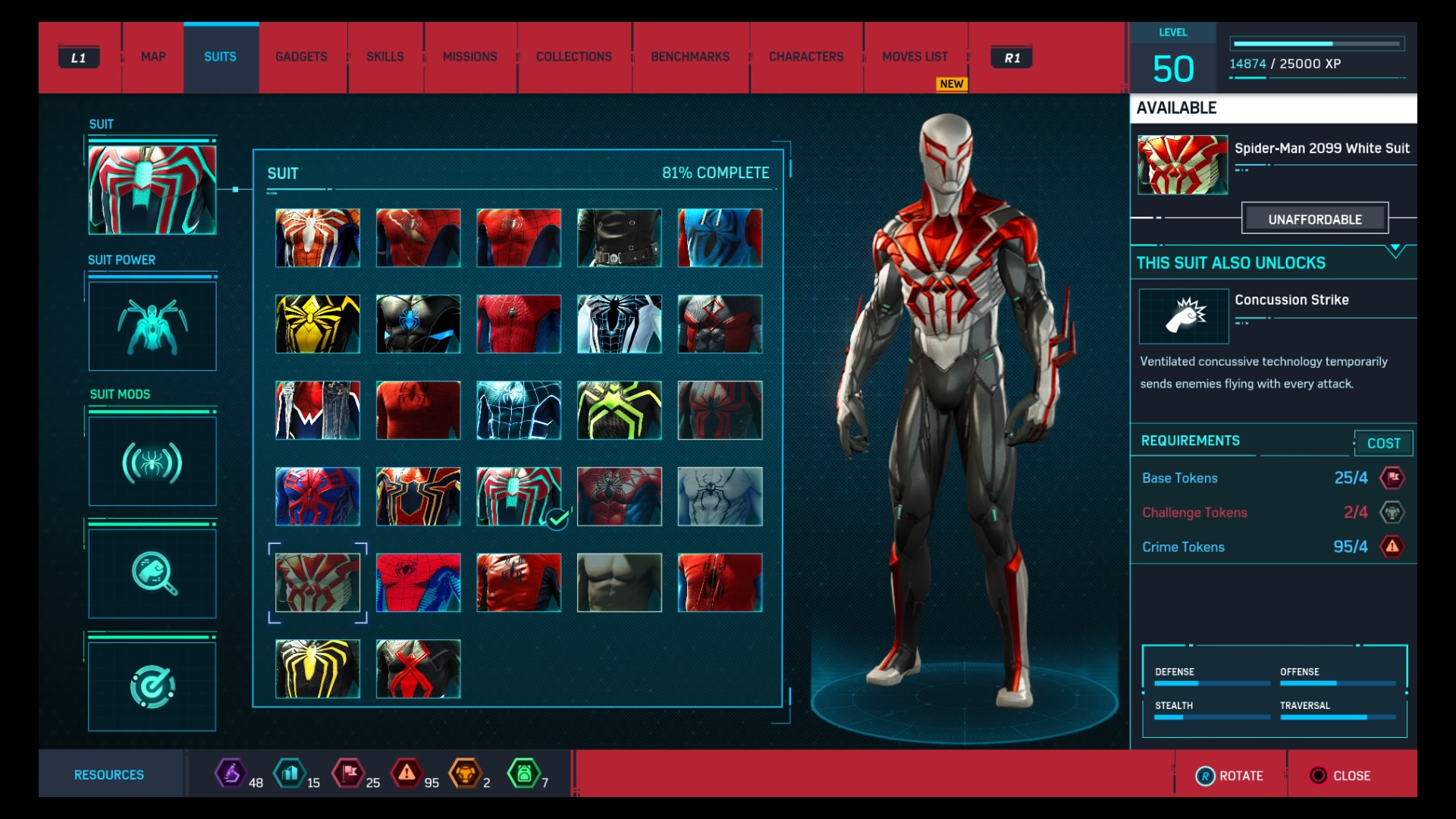
While a huge fan of Spider-Man 2099 (Miguel O'Hara), and the theory behind his updated white suit, its appearance in-game is little more than some shiny power armor without some of the really cool visual features that make it special in the comics, like the red glow and ability to change colors. It still looks pretty cool, but it's not among our favorite suits in the game.
-
#23 Stark Suit
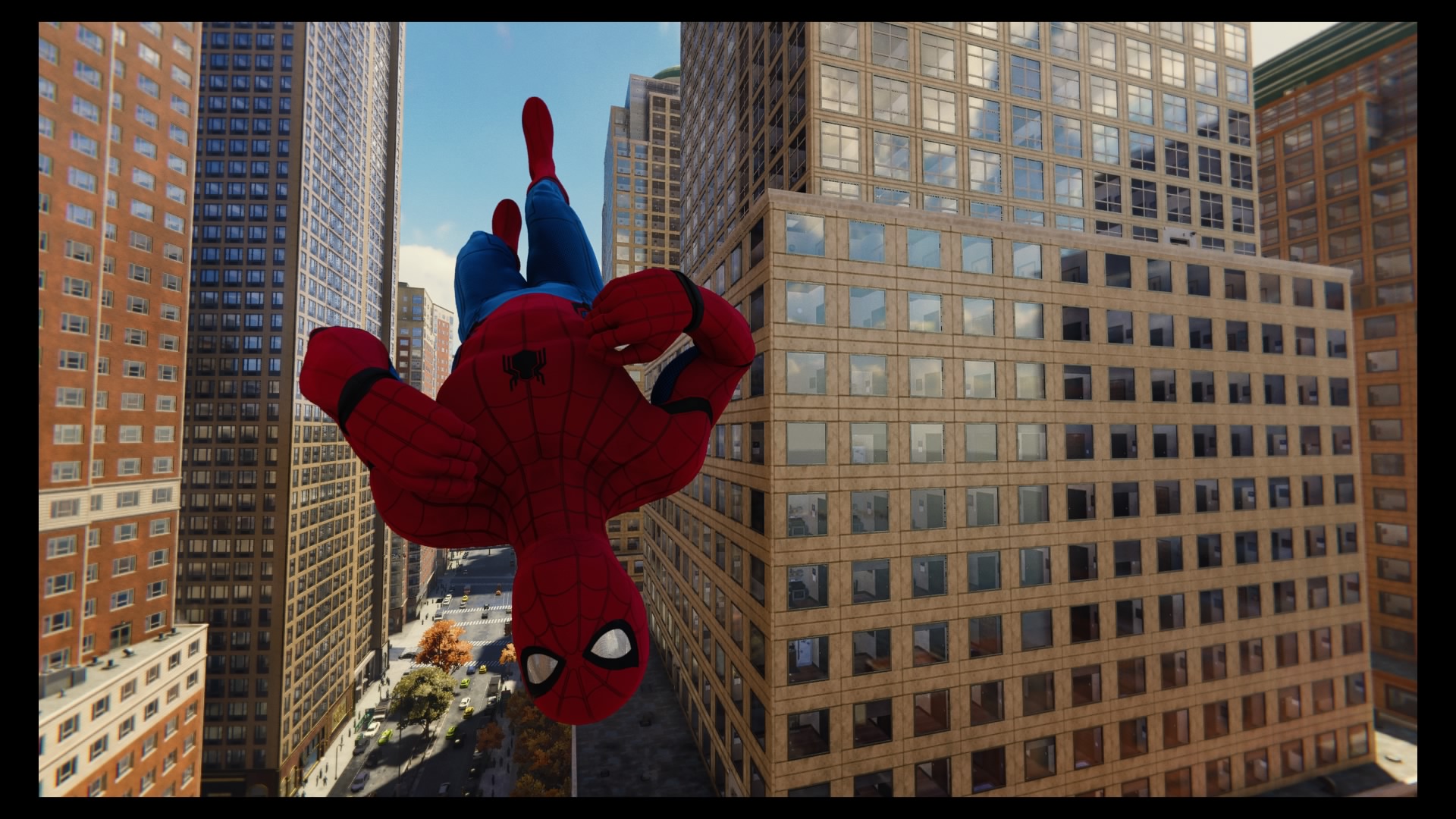
The Stark Suit is a special nod to the suit that Peter was given by Tony Stark (Iron Man) in the Captain America: Civil War MCU film, and subsequently used in Spider-Man: Homecoming. While a cool nod to more modern representations of the character, it's not a particularly spectacular suit among the rest of the pack.
-
#22 Wrestler Suit
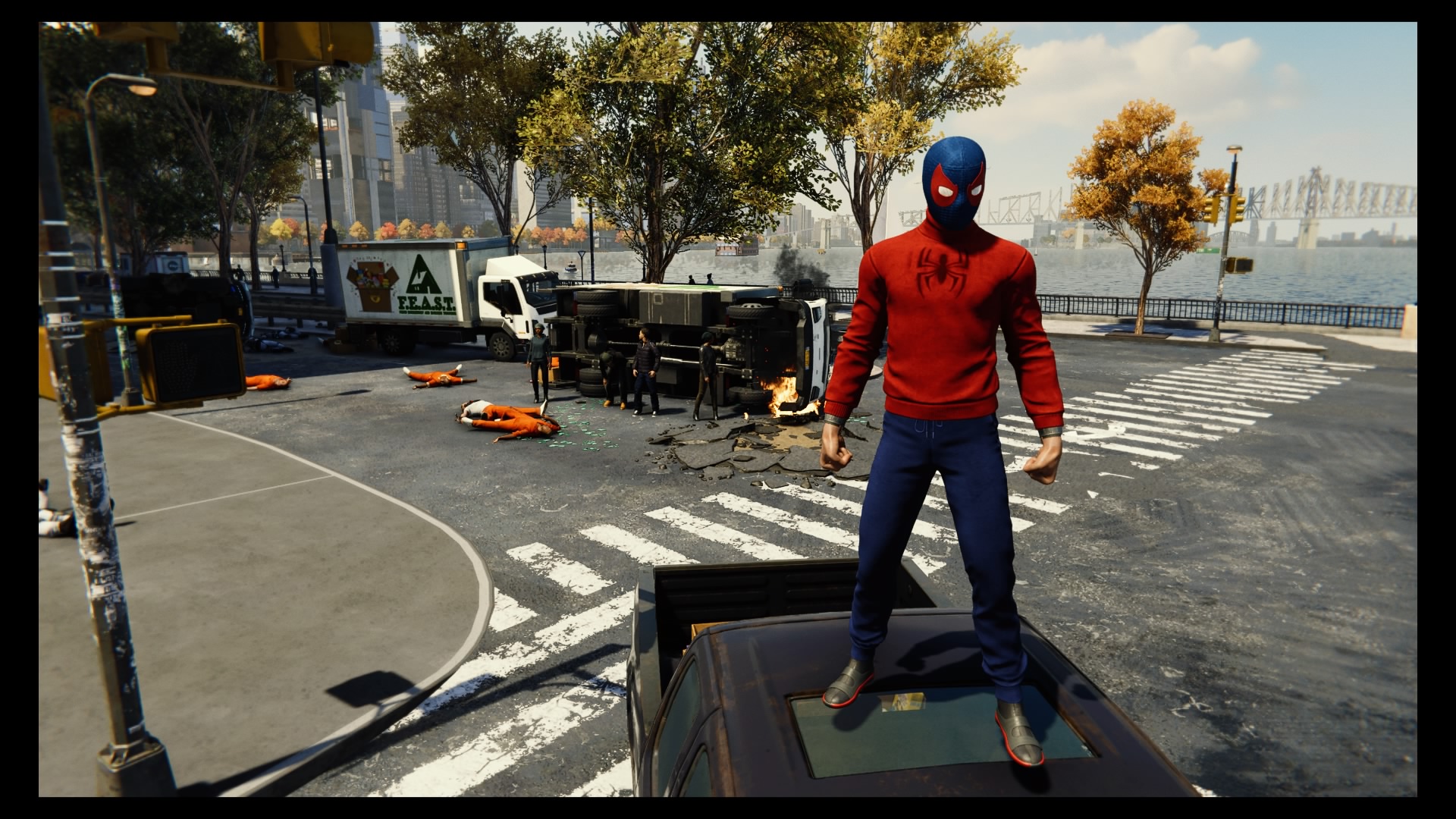
When Peter Parker first discovered he had powers, he donned a mask and dove headfirst into an underground wrestling arena. This is the costume that he wore in that fated moment (where Uncle Ben would be killed shortly after). It's not the slickest looking suit in the game, but it's humorous and unique.
-
#21 Velocity Suit
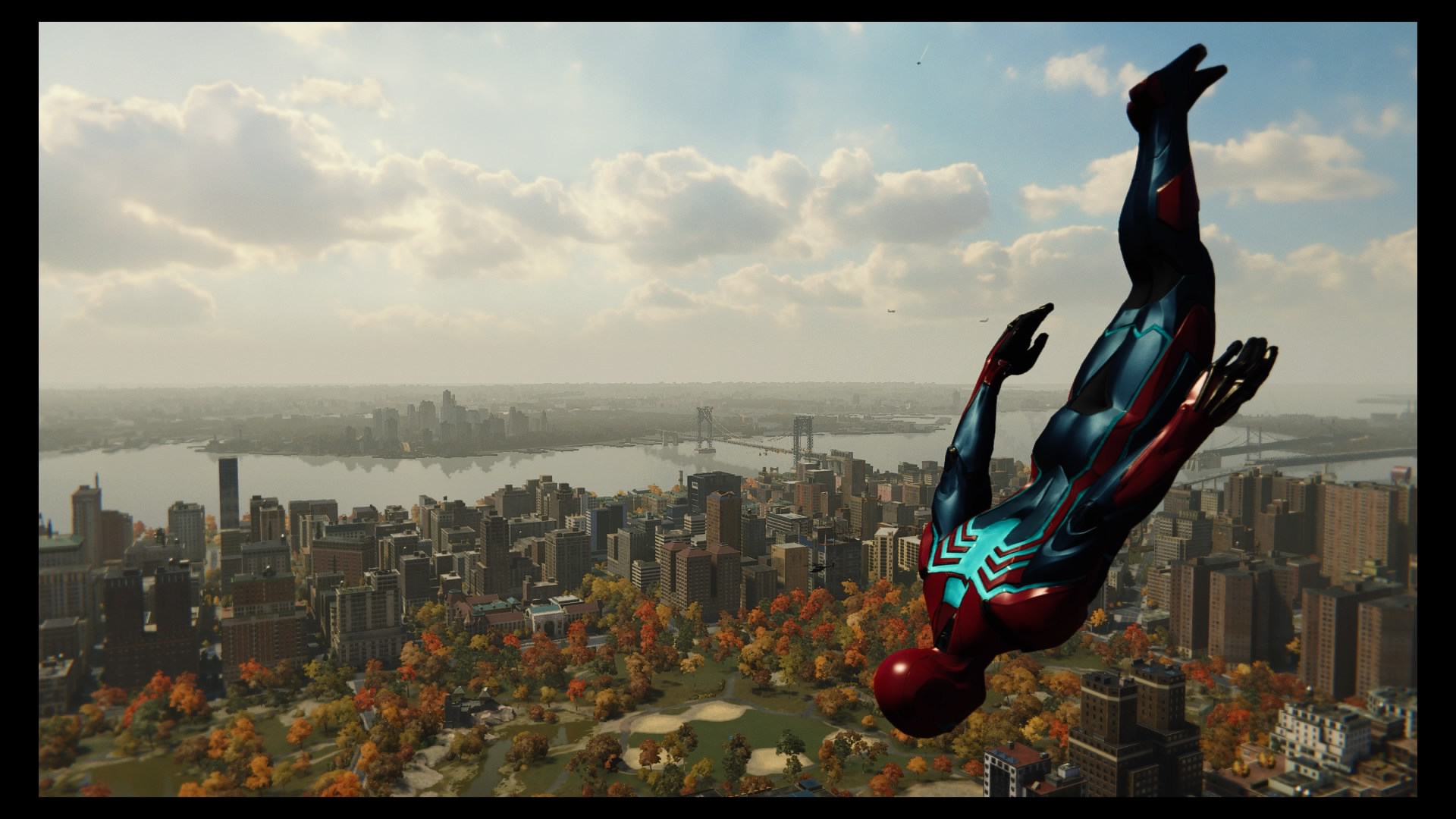
The Velocity Suit is completely new for Marvel's Spider-Man PS4, and it's designed for speed. It's got a pretty cool futuristic look to it, with glowing accents and an overall sheen.
-
#20 Advanced Suit
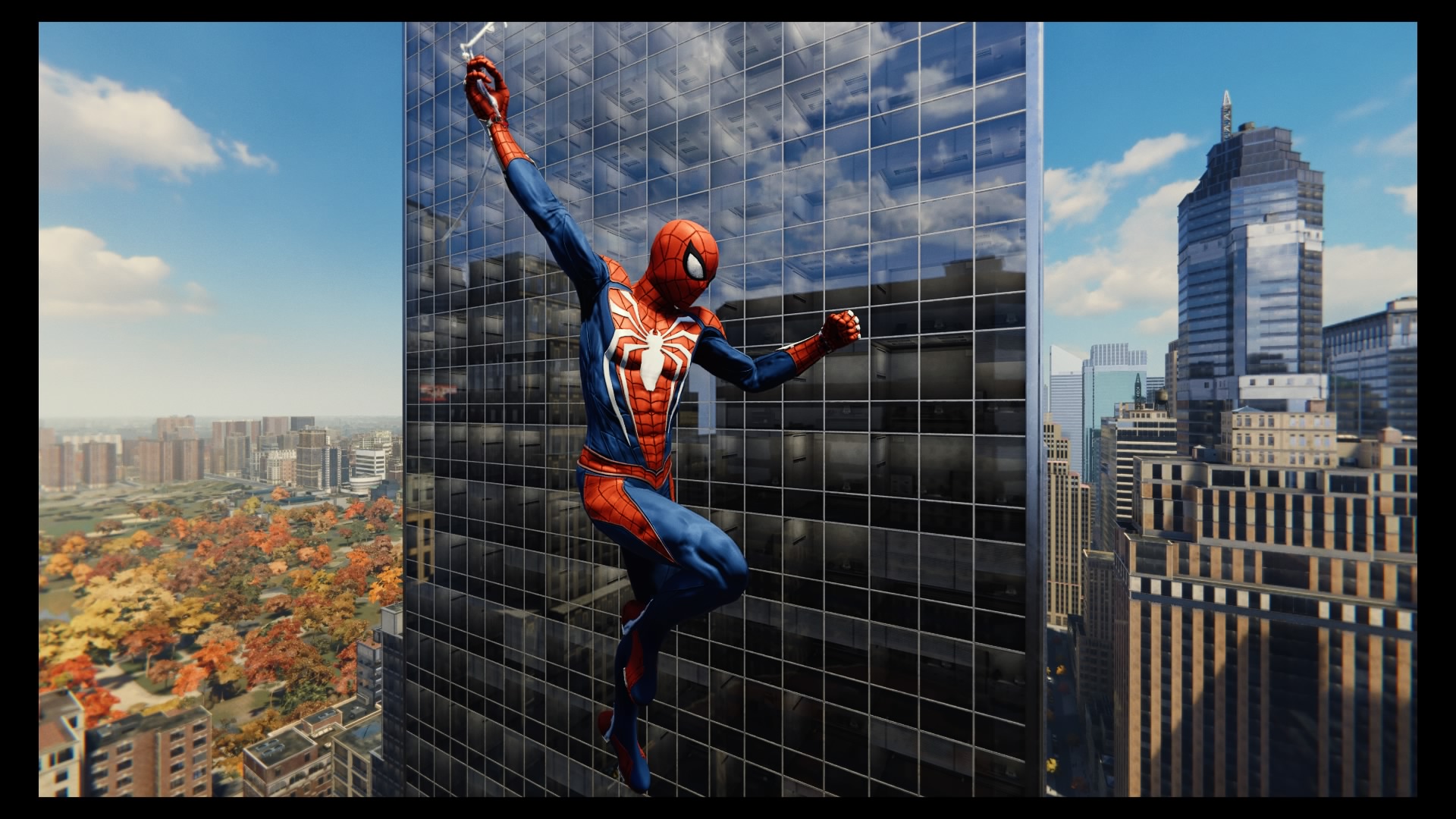
The Advanced Suit is the main suit for Marvel's Spider-Man PS4. It was created by Insomniac specifically for the game and has an interesting origin story with who helps Peter to build it. Most notably, it has new white accents that really pop on top of the classic Spidey look.
-
#19 Dark Suit
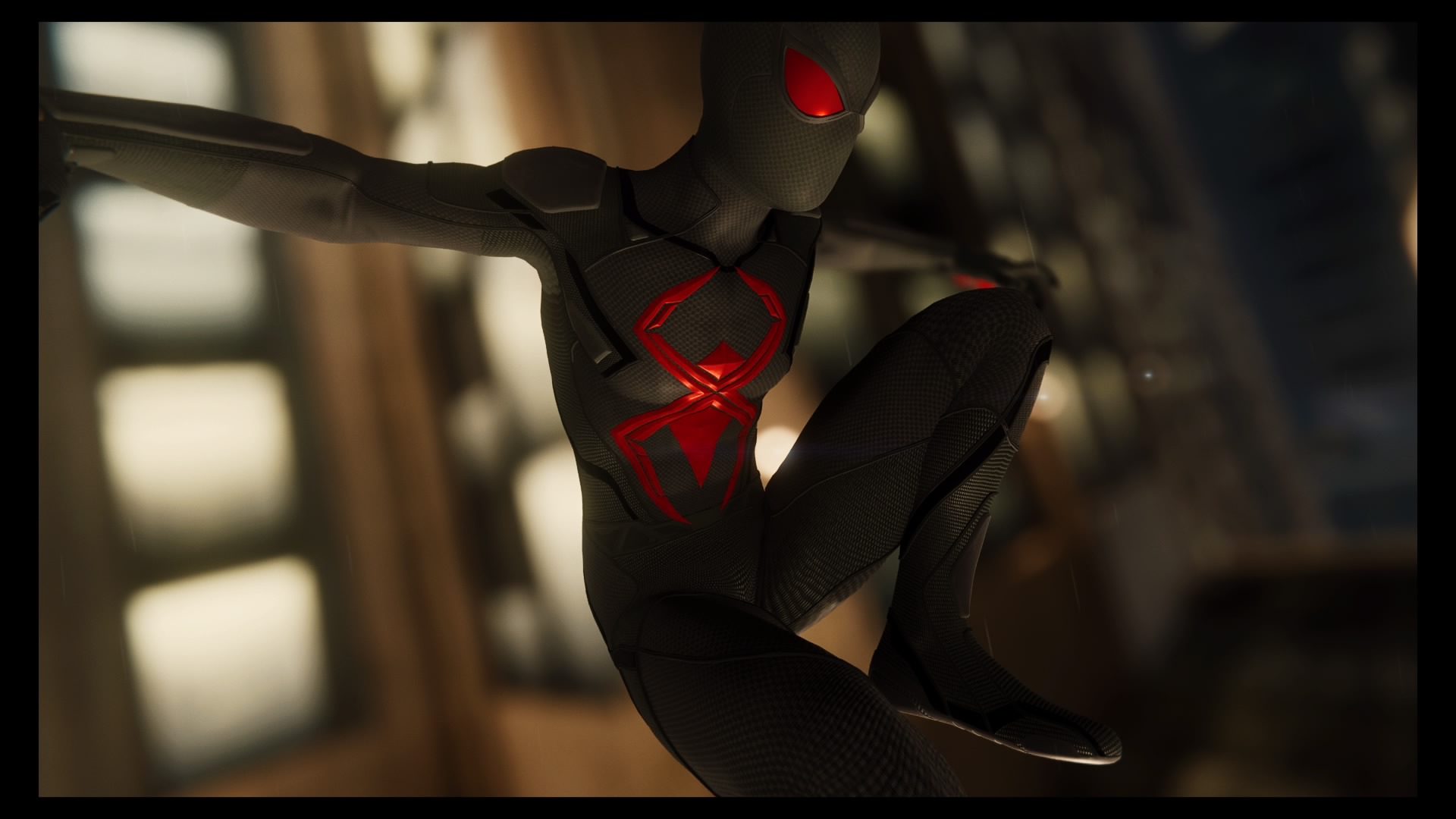
Earned for completing all of the Black Cat photo-op missions in the game, this is a stealth suit with a red spider and eyes. It looks pretty cool, but it still doesn't rank among our most favorite Spidey suits in the game.
-
#18 Spider Armor - MK II Suit
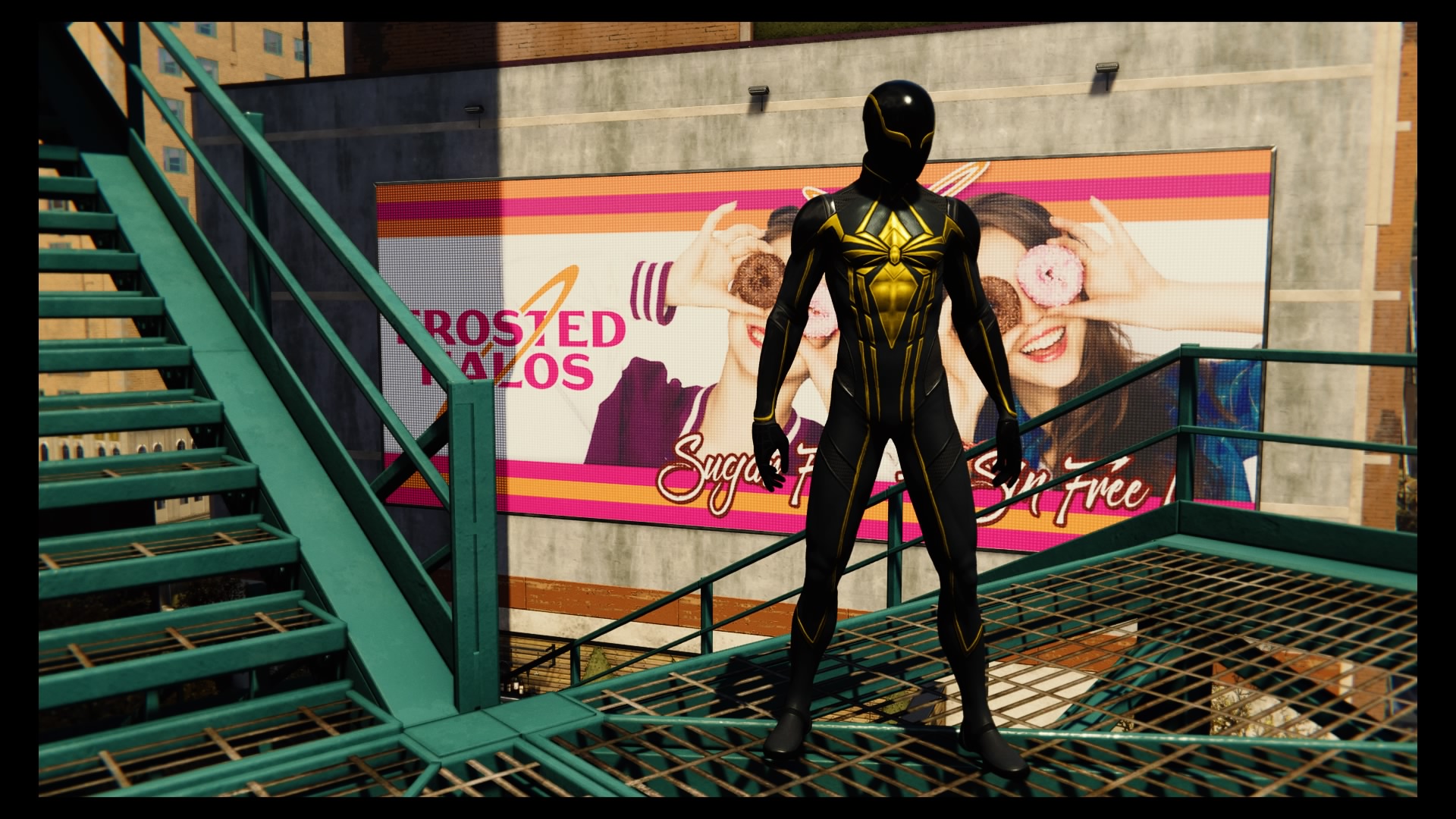
How is it that the suit that came before the MK III armor looks better than that bulky mess? The MK II Spider Armor has a really cool black and gold sheen, keeping Spidey's narrow frame while giving him bullet proof plating.
-
#17 Secret War Suit
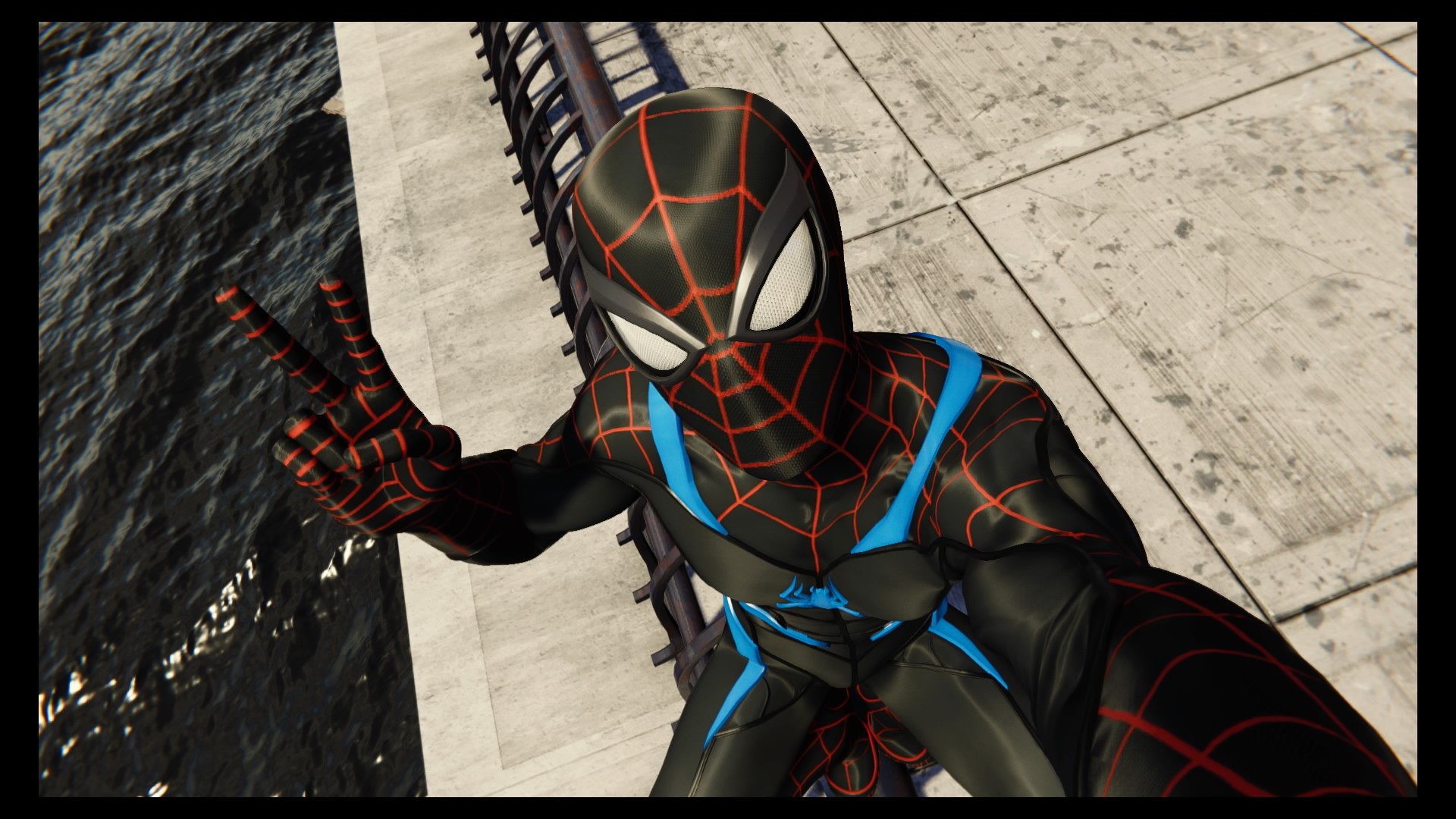
Not to be confused with his Secret Wars symbiote suit created in the '80s, Spidey's Secret War suit comes from the 2004-2005 Marvel crossover event, featuring a unique design of red webbing on black material, with blue accents.
-
#16 Spider Armor - MK IV Suit
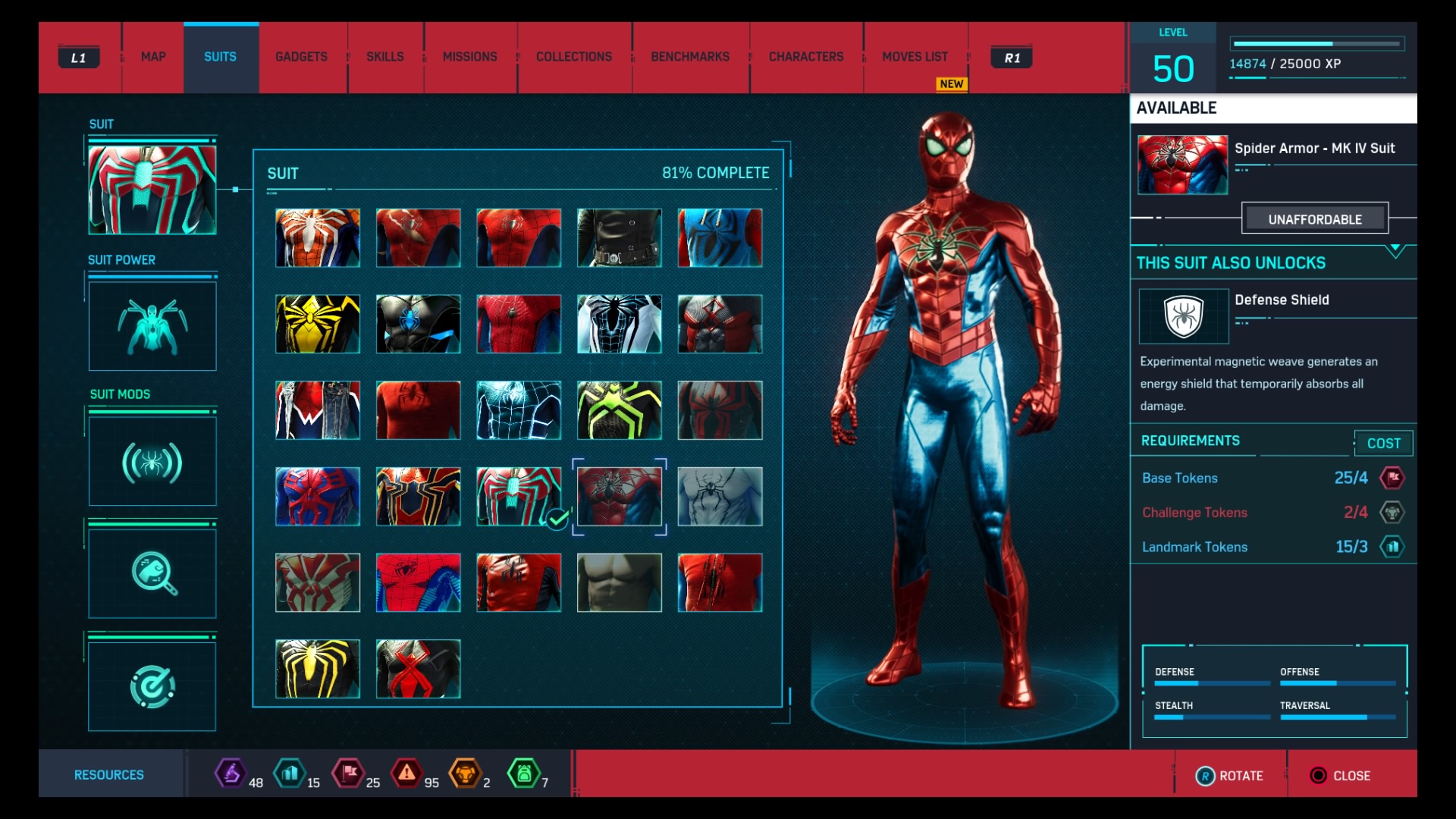
Bythe Spider Armor MK IV, it looks like Peter just wanted to go with his Classic Spider Suit design with an armored plating over the top of it, so what we get is effectively shiny metallic Spider-Man. Who doesn't love shiny?
-
#15 Classic Suit (Damaged)
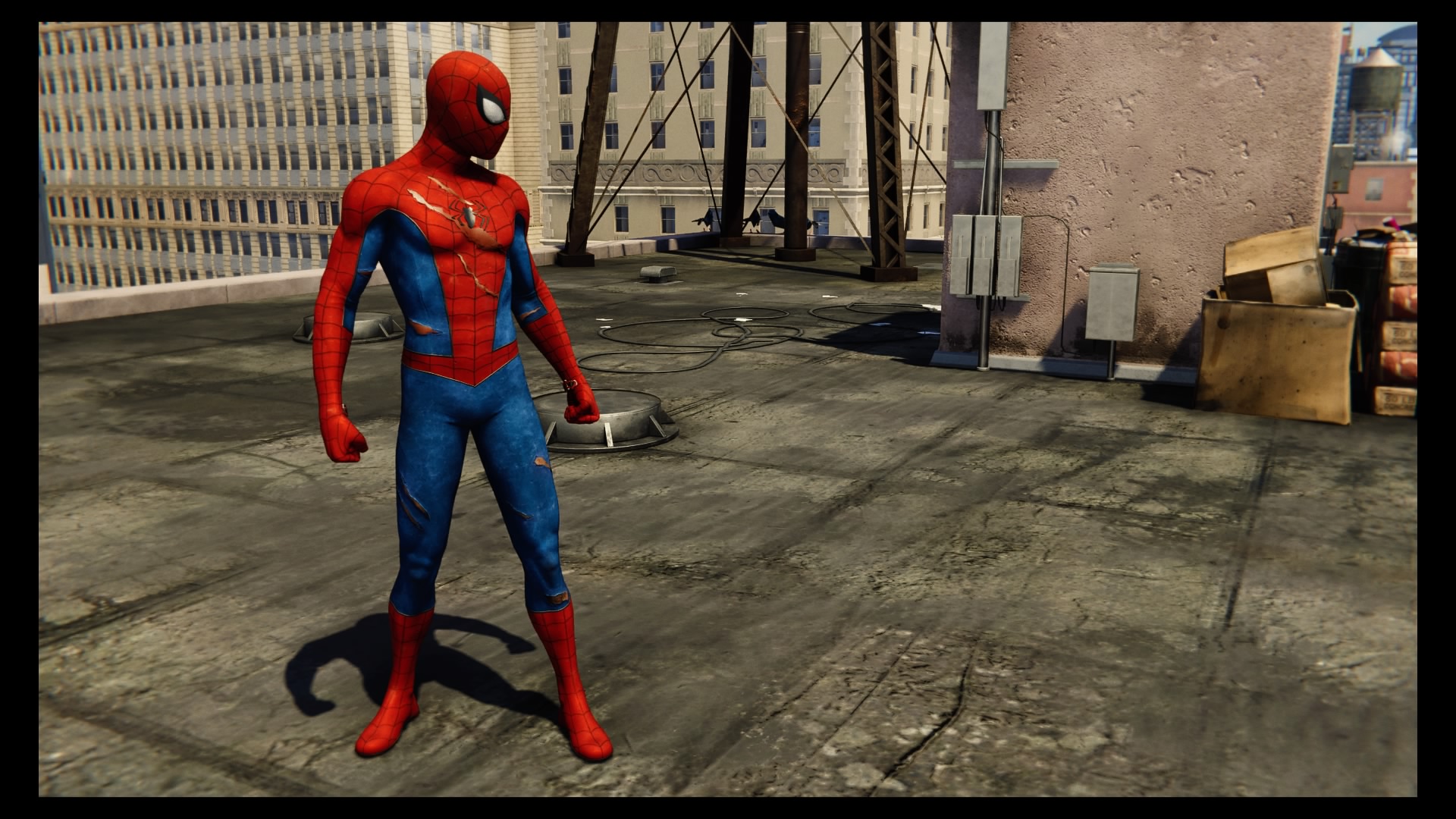
While we may not have been too keen on the clean Classic Suit, the damaged version of the suit tells a story through it's ripped fabric. This is a hero who has been through some stuff and only barely come out on the other side. We don't always need to see our heroes in their pristine costumes. Sometimes a bit of damage is good!
-
#14 Homemade Suit
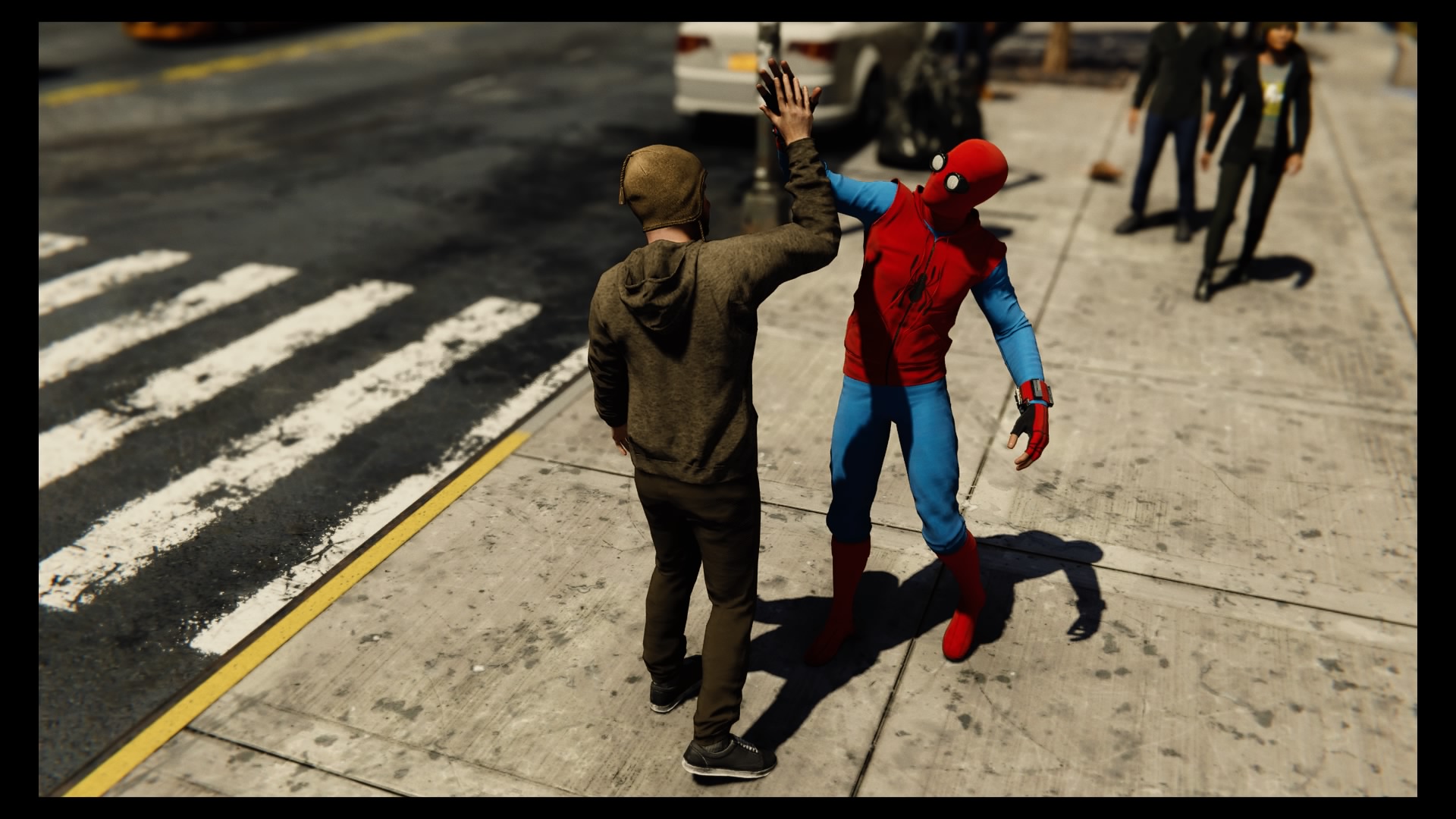
More for laughs than anything else, this blue sweatpants, red socks, goggles combo is what Peter first wore in Spider-Man: Homecoming as he started his superhero career.
-
#13 Undies
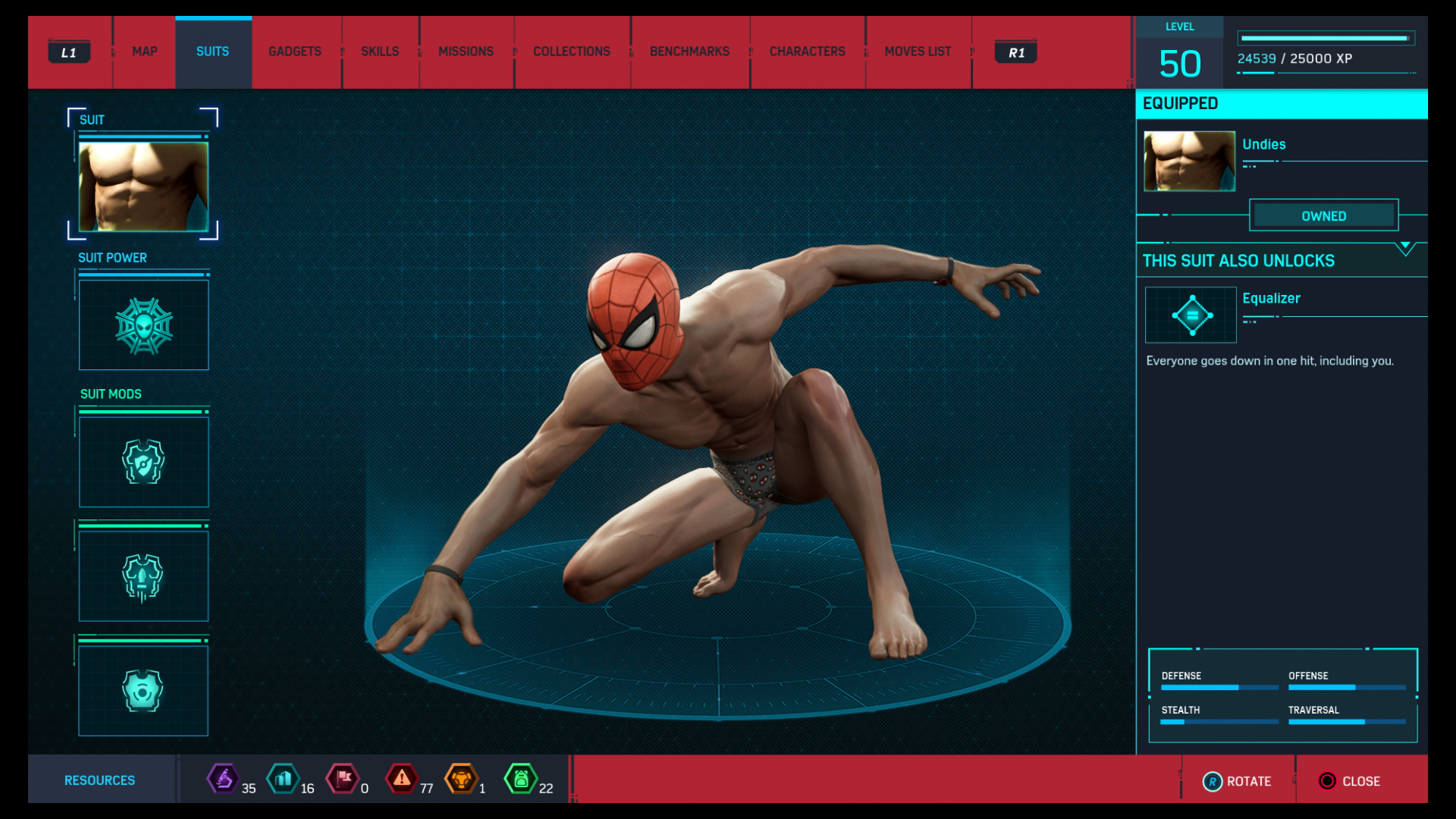
Making a little bit more sense once you finish the game, the Undies Suit (or lack of suit) is your reward for finishing the entire game 100%. Get it done before the DLCs come out, and just maybe Peter can be super awkwardly in his skivvies for all of the cutscenes. Count me in.
-
#12 Anti-Ock Suit
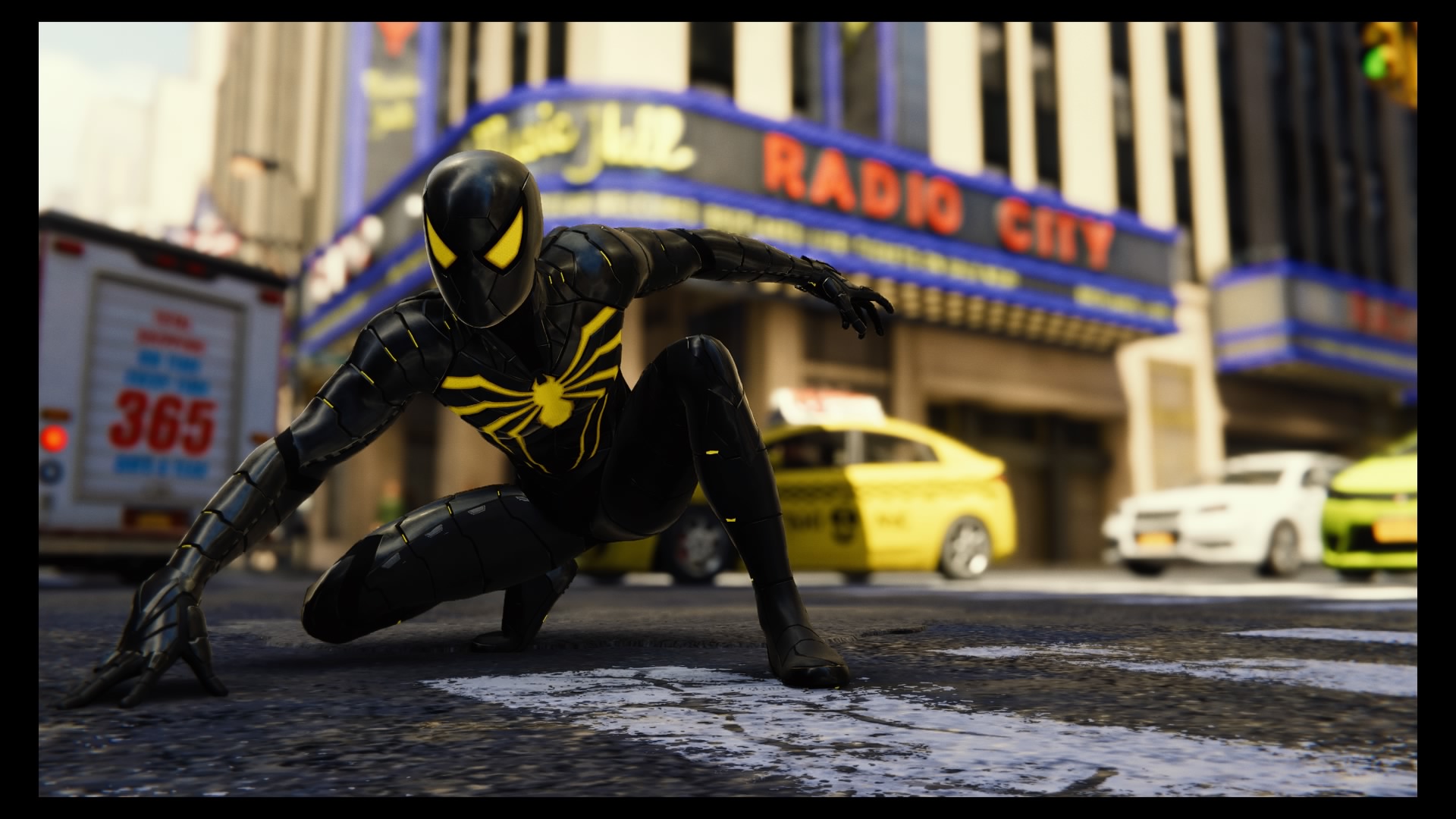
Another exclusive for Marvel's Spider-Man PS4, this costume plays into the campaign, and we think that Insomniac did a pretty great job with the design.
-
#11 Stealth (“Big Time”) Suit
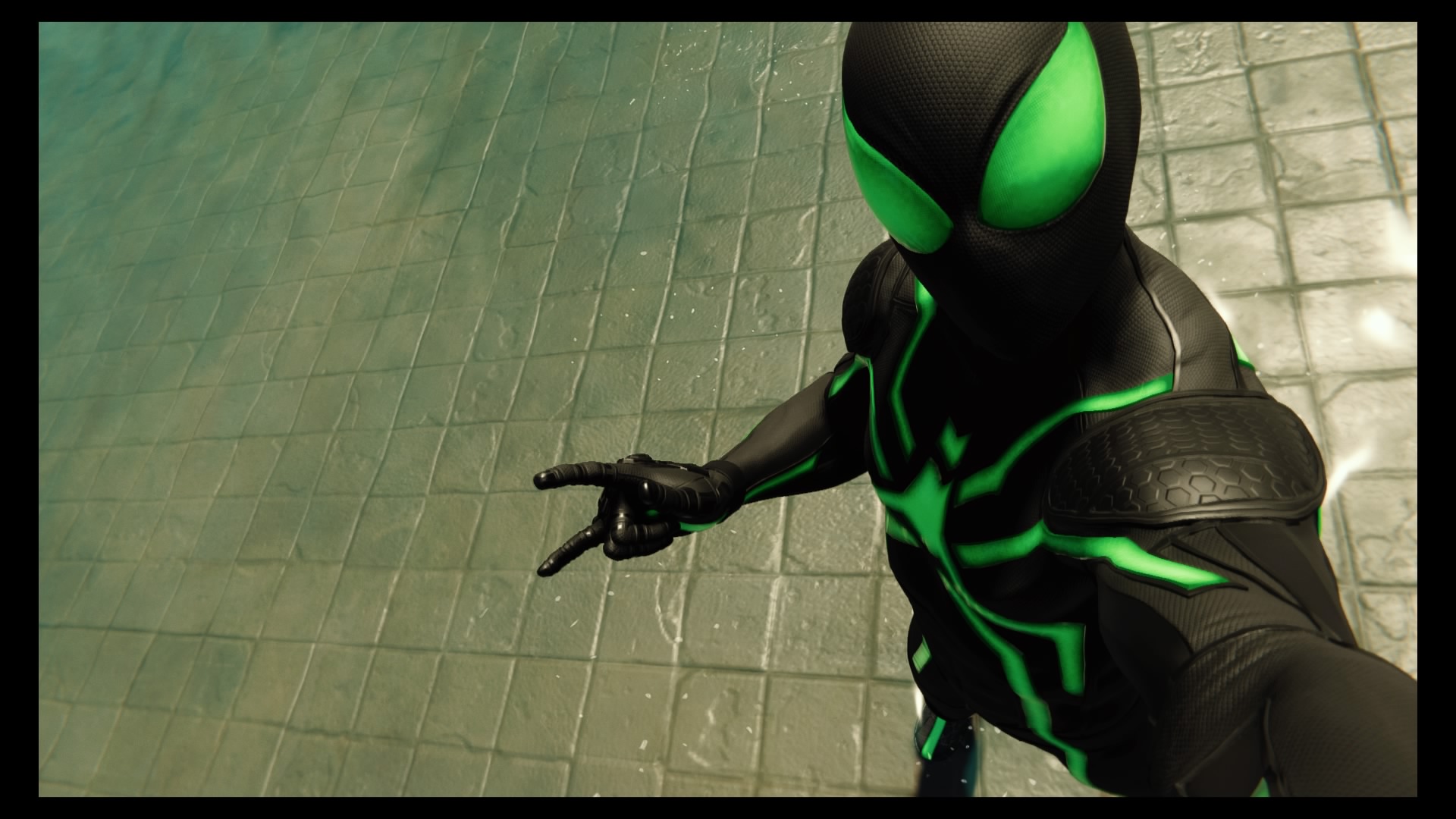
In the comics, this suit actually changes its accents from red to blue to green depending on which stealth mode it is in. Marvel's Spider-Man PS4 locks it into its neon green configuration, but it still looks pretty cool to swing around New York City with.
-
#10 Fear Itself Suit
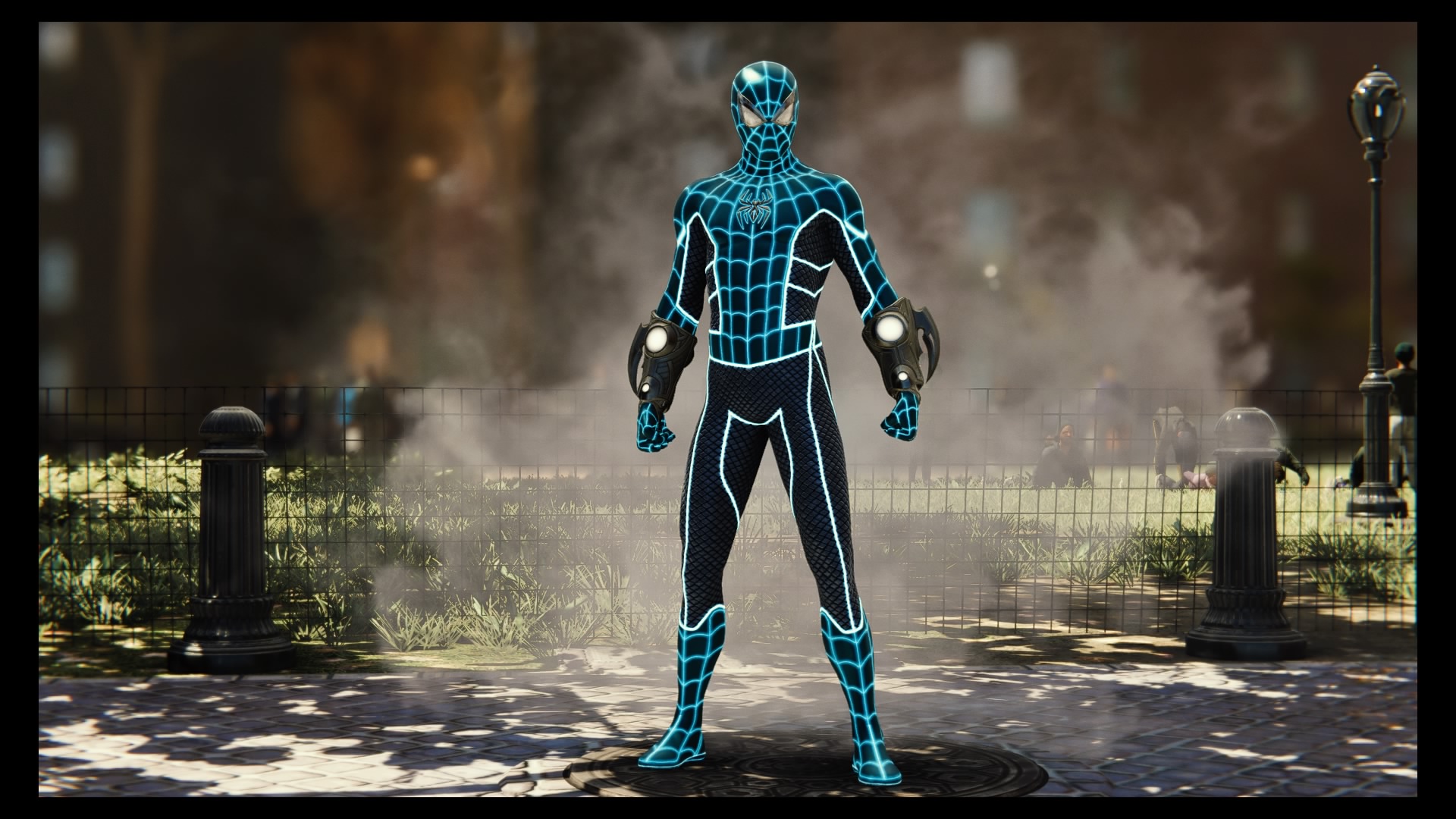
Here we go! Top 10! For number 10, the Fear Itself Suit starts our list. During this comic arc, Tony Stark and the Dwarves of Nidavellir made a number of suits for various heroes and this was Spider-Man's. The aesthetic really brings across the whole Fear Itself storyline, which is about a villain who creates fear in Marvel heroes.
-
#9 Spirit Spider
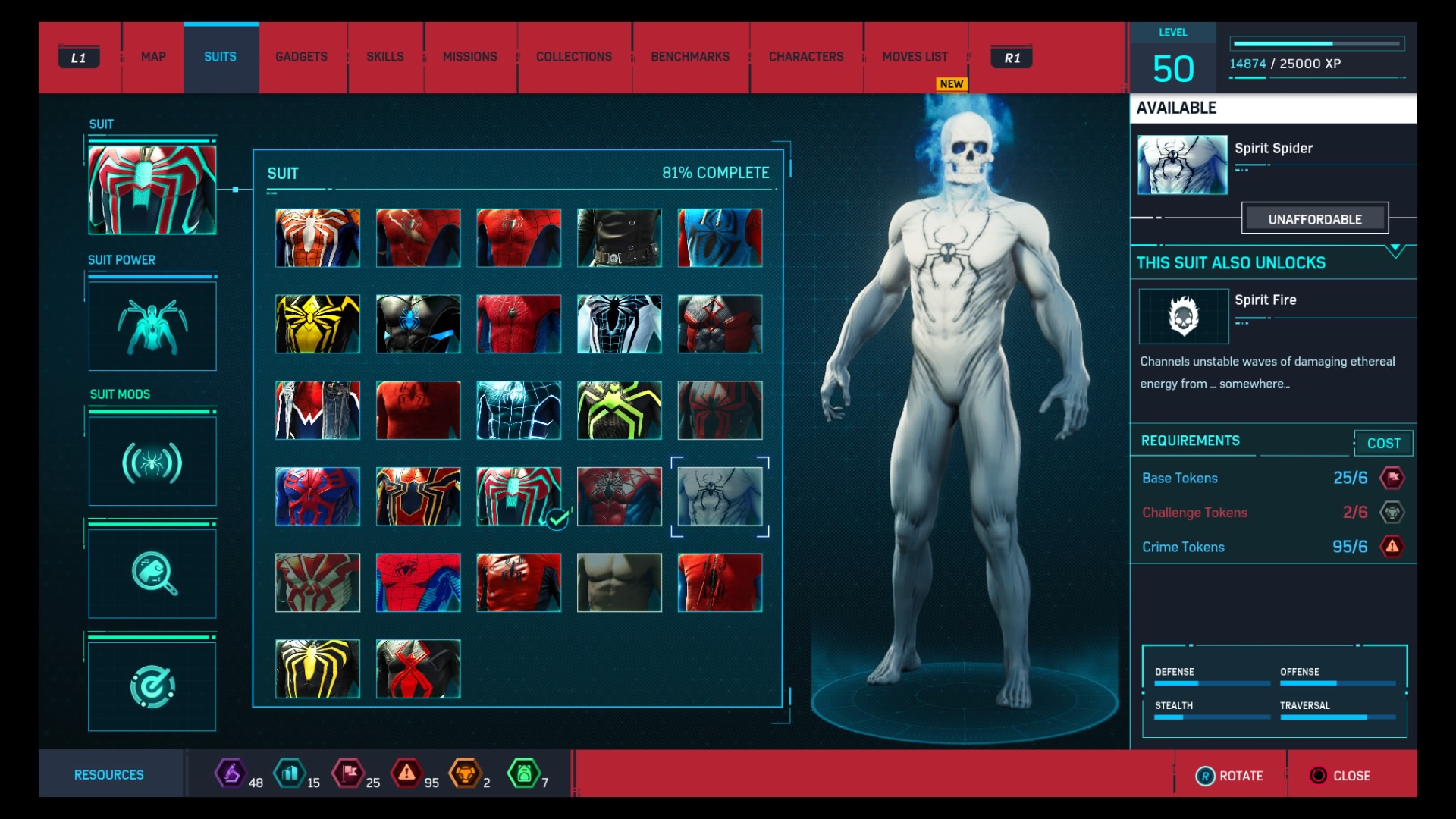
What if Spider-Man and Ghost Rider crossed over? While that's not exactly what happened here, an alternate universe version of Spider-Man did try to absorb all of the other Spider-Men before having his own spirit trapped in Hell where it got saddled with dark powers similar to what gives Ghost Rider his flaming skull head. Ghost Spider!
-
#8 Spider-Man 2099 Black Suit

I just love the look of the Spider-Man 2099 Black Suit, even if it is decidedly blue. Peter Parker himself doesn't actually where this one. That honor belongs to a future Spider-Man, Miguel O'Hara. It's one of the most visually striking suits in the game while honoring some classic Spidey stories.
-
#7 Negative Suit
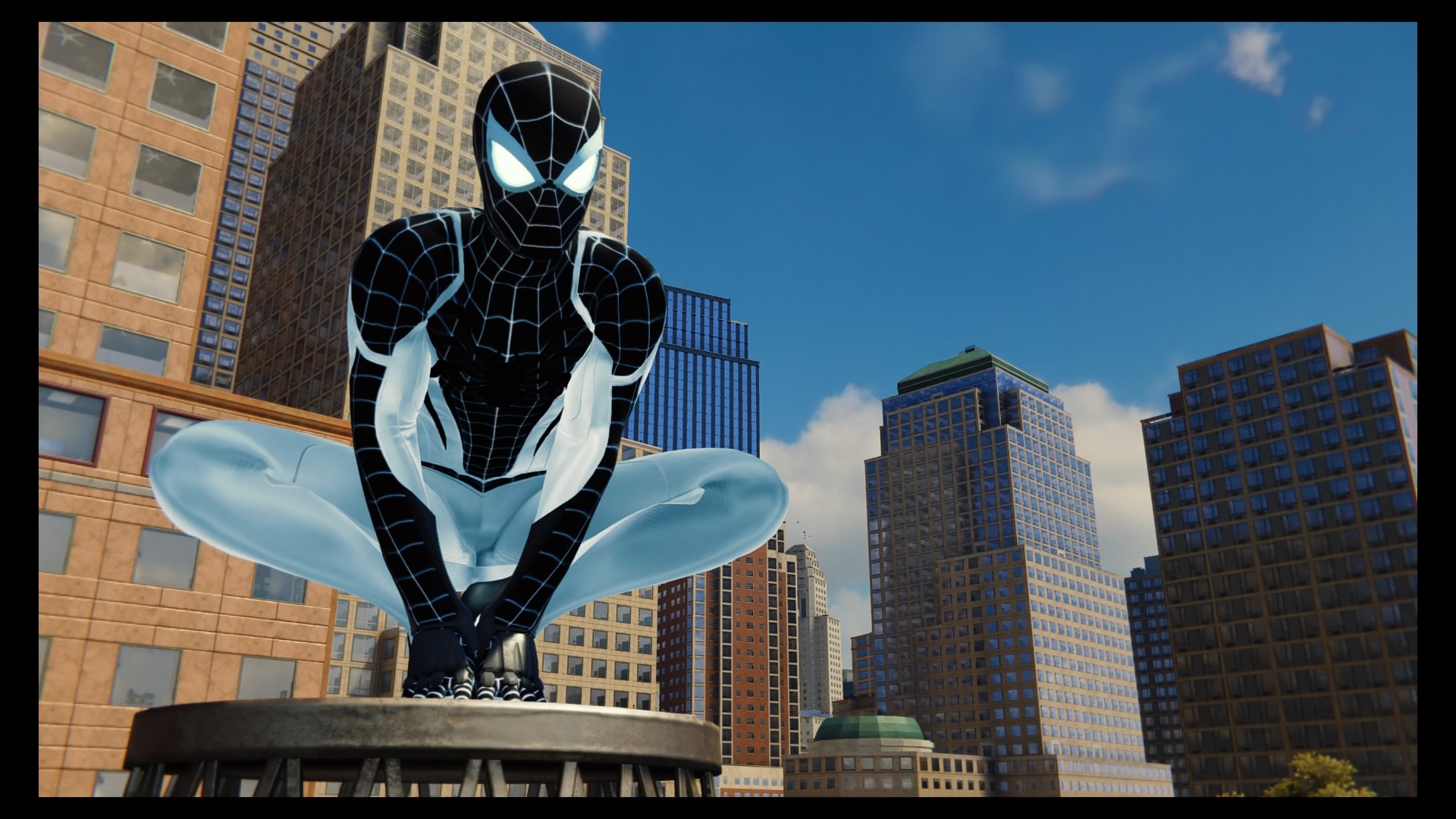
Despite fighting Mister Negative in the game, this suit actually has a history from when Spider-Man went into the Negative Zone. The Negative Zone has no color, so the suit transformed to match, and Insomniac designed it with their own special flair to match the look of Mister Negative and his Demons in the game.
-
#6 Spider-Punk
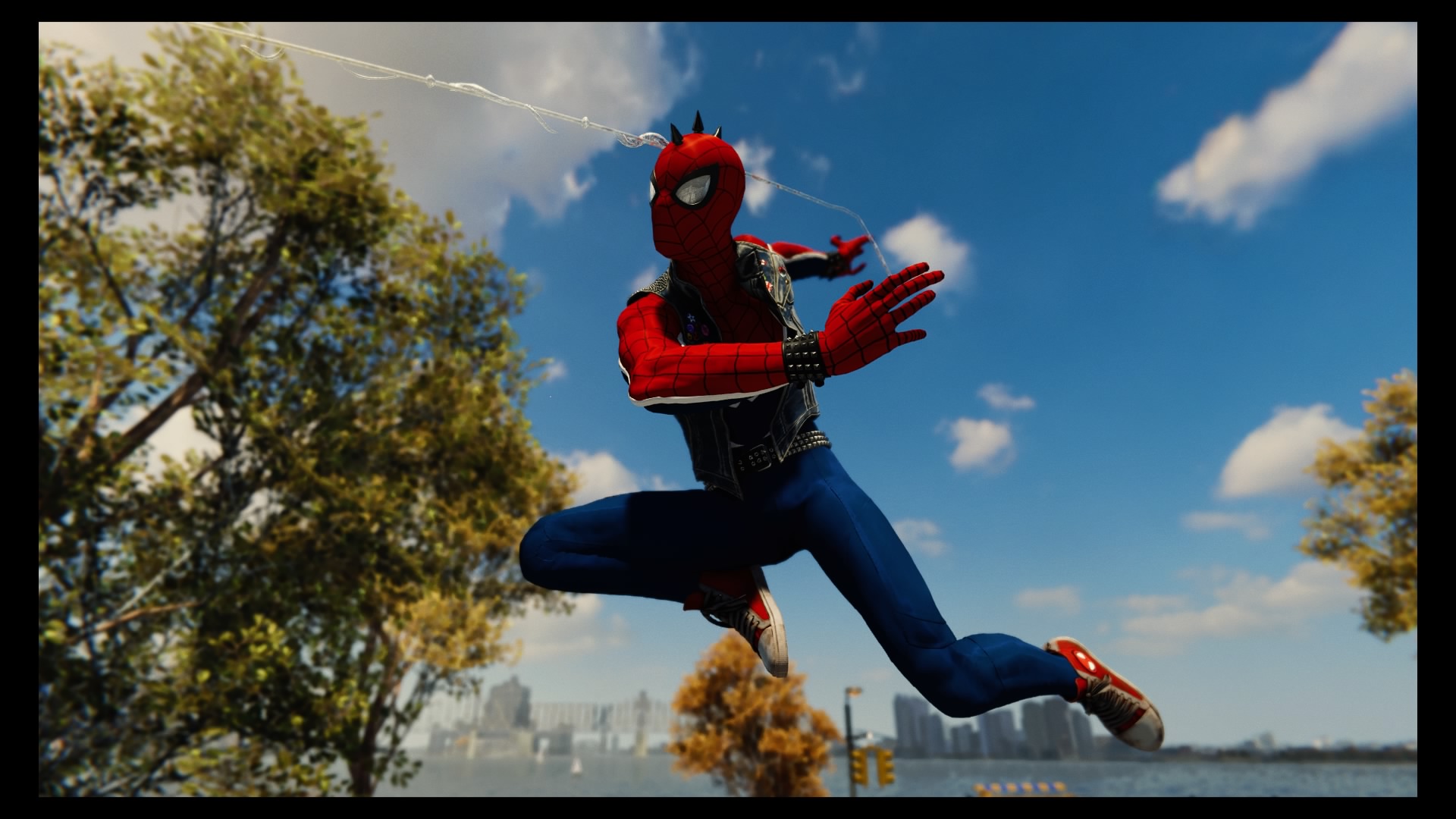
Spidey already shirks authority, throwing quip after quip around and skirting the edge of the law (as most heroes do). In reality, he's one step away from being a punk, so this suit really speaks to his brand. Spider Punk is not a Peter Parker outfit, but that of Hobart Brown, an activist fighting back against the man and an oppressive government in a way that only punks can.
-
#5 Scarlet Spider Suit
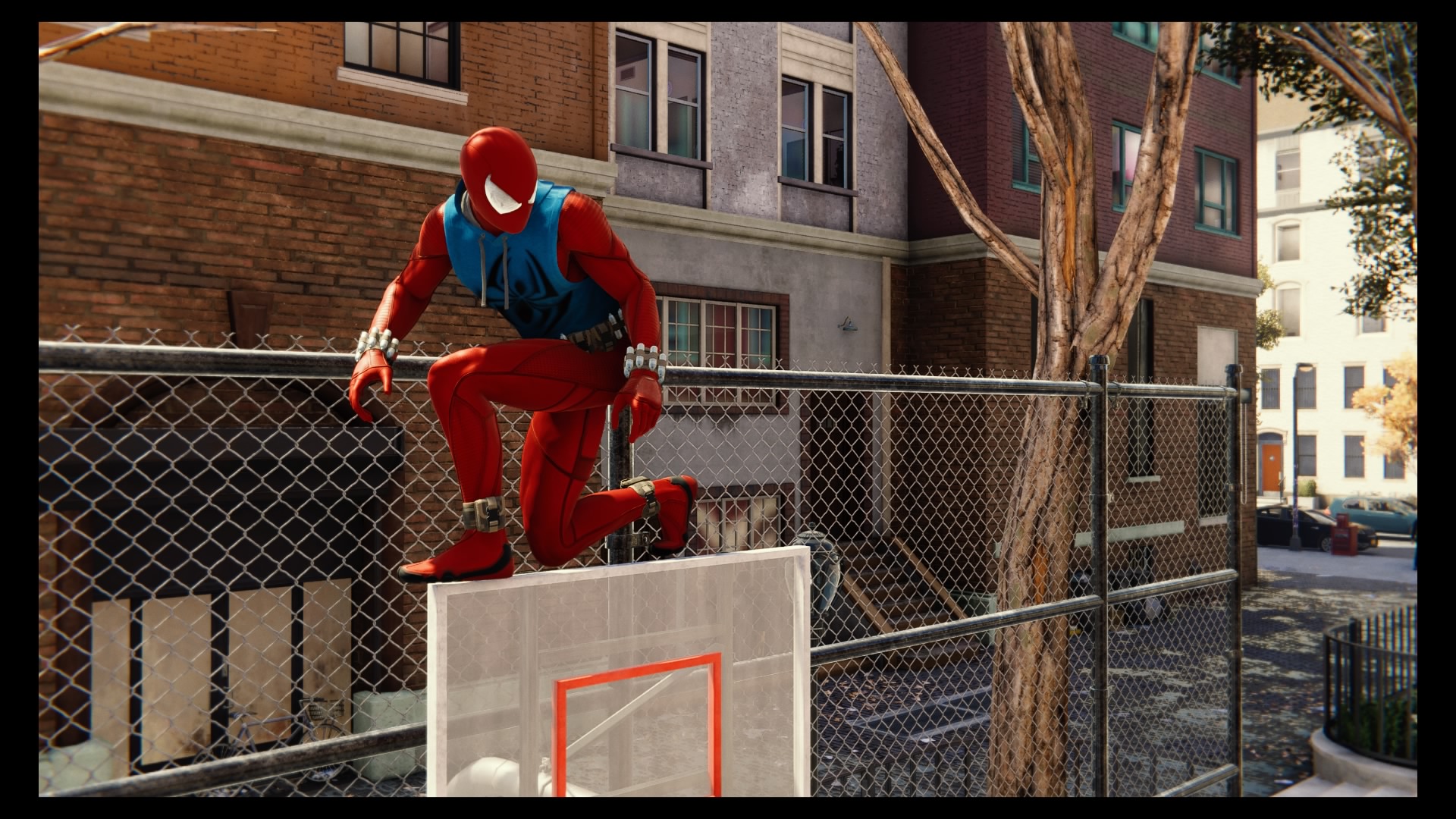
Something about the Scarlet Spider seems so cool and relatable. He wears a skintight red suit, but a sleeveless hoodie over the top of it. While Peter Parker did become the Scarlet Spider at one point, this version is Ben Reilly, a clone of Spider-Man.
-
#4 Iron Spider Suit
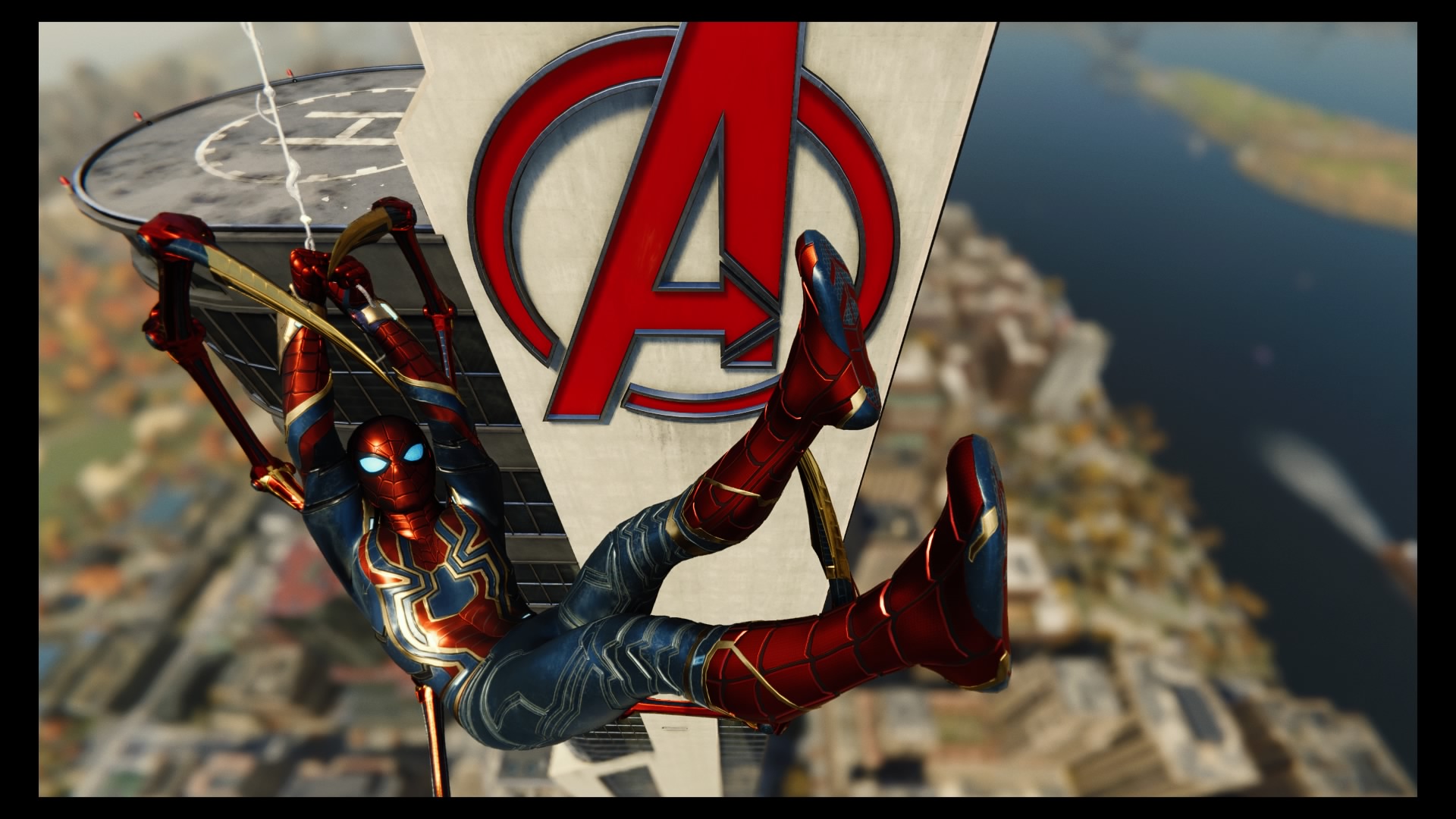
Paying homage to Avengers: Infinity War and the costume that Tony Stark gifts to Peter, the Iron Spider suit is an incredible looking Marvel that even comes with the extended metal spider legs as a bonus power.
-
#3 Last Stand Suit
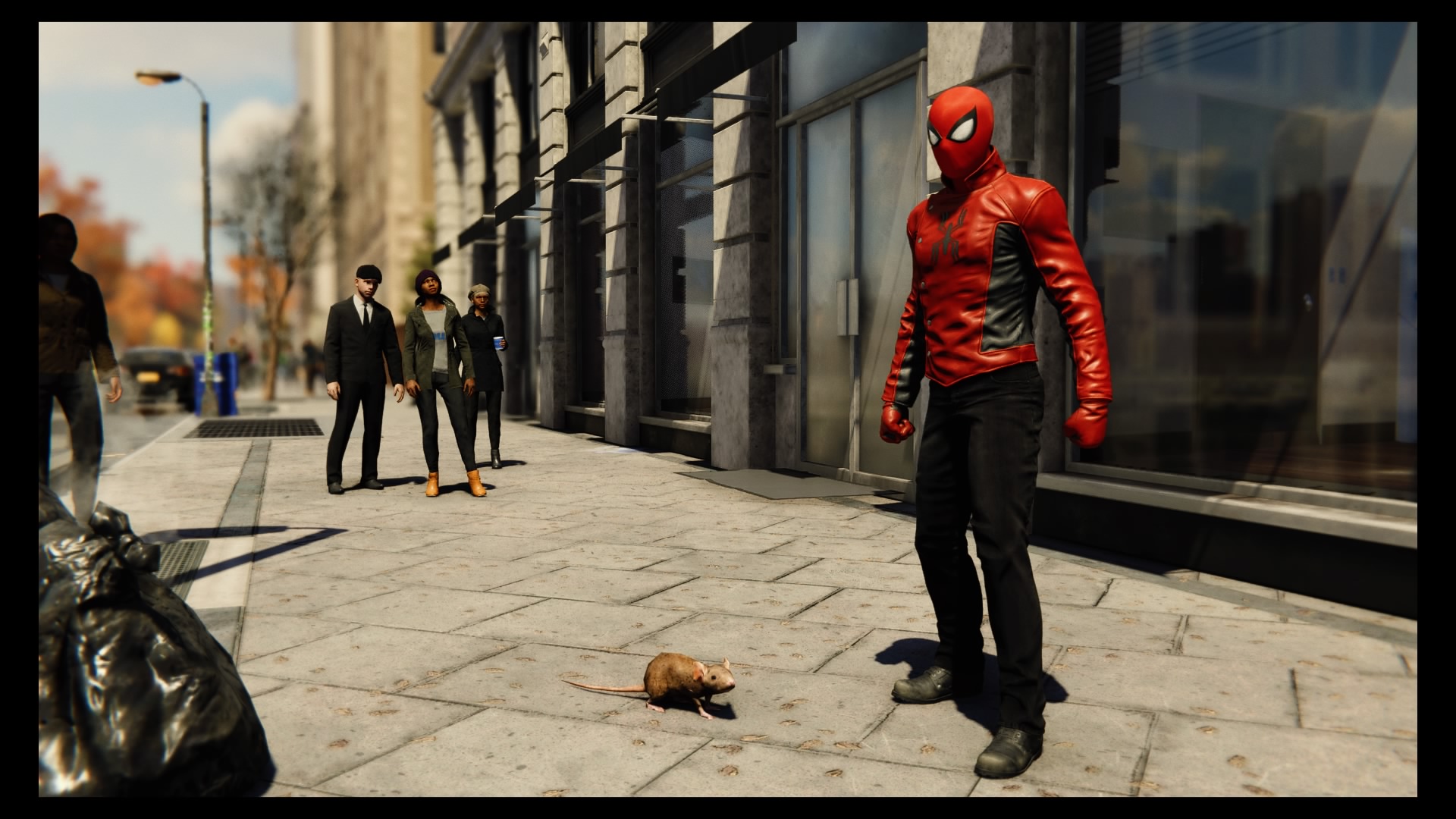
Something about the Last Stand Suit just oozes cool. Here's a guy in what amounts to black jeans and a motorcycle jacket, wearing a Spider-Man mask and fighting crime. This is a much older and darker Peter from an alternate timeline, one that's not afraid to kill. This is the outfit he is wearing when he is ultimately shot and killed by the NYPD.
-
#2 Noir Suit
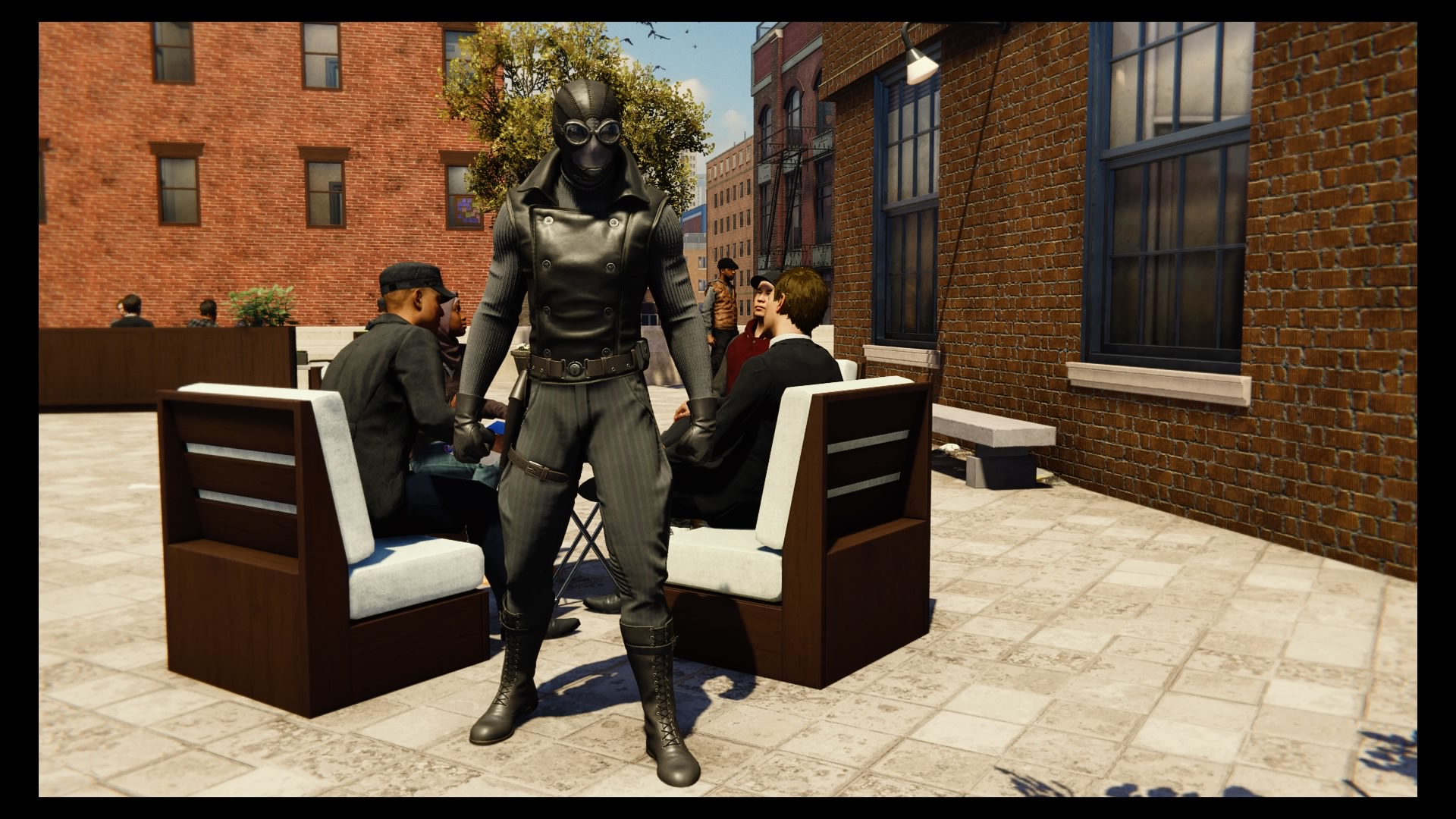
Spider-Man Noir is an alternate universe version of the Spider-Man story that takes place in the early 1900s. He uses guns for weapons and doesn't mind killing when needed, due to his dark upbringing during the Great Depression. This look for Spider-Man has always been one of my favorites, but it doesn't quite match up to number 1.
-
#1 Vintage Comic Book Suit
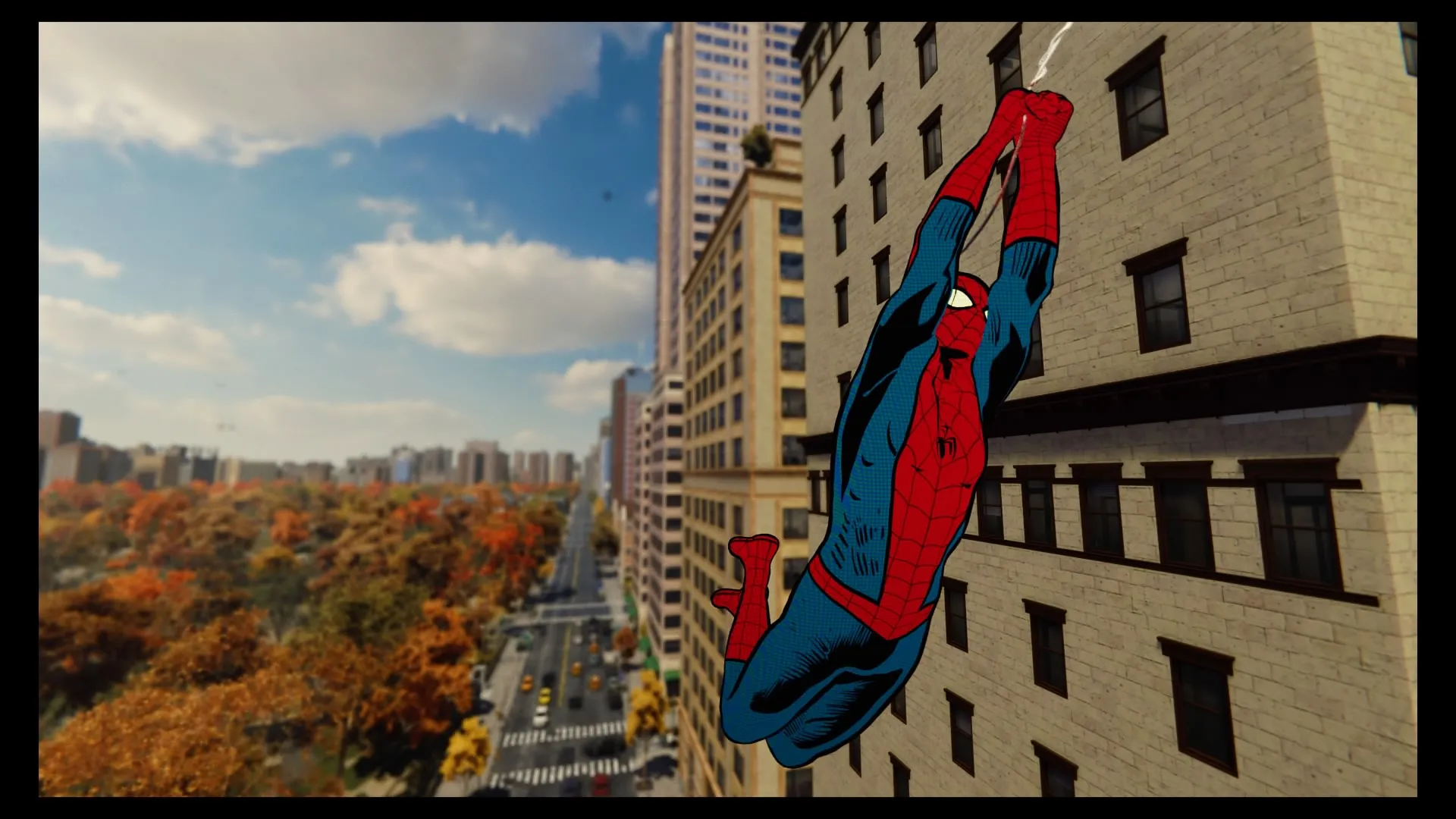
The Vintage Comic Books Suit gives Spidey a cartoony cel-shaded appearance that looks incredible against the high-resolution backdrop of New York City. It reminds me a lot of the upcoming Spider-Man: Into the Spider-Verse movie with the way the animation looks, and is an amazing addition to the game.
